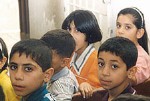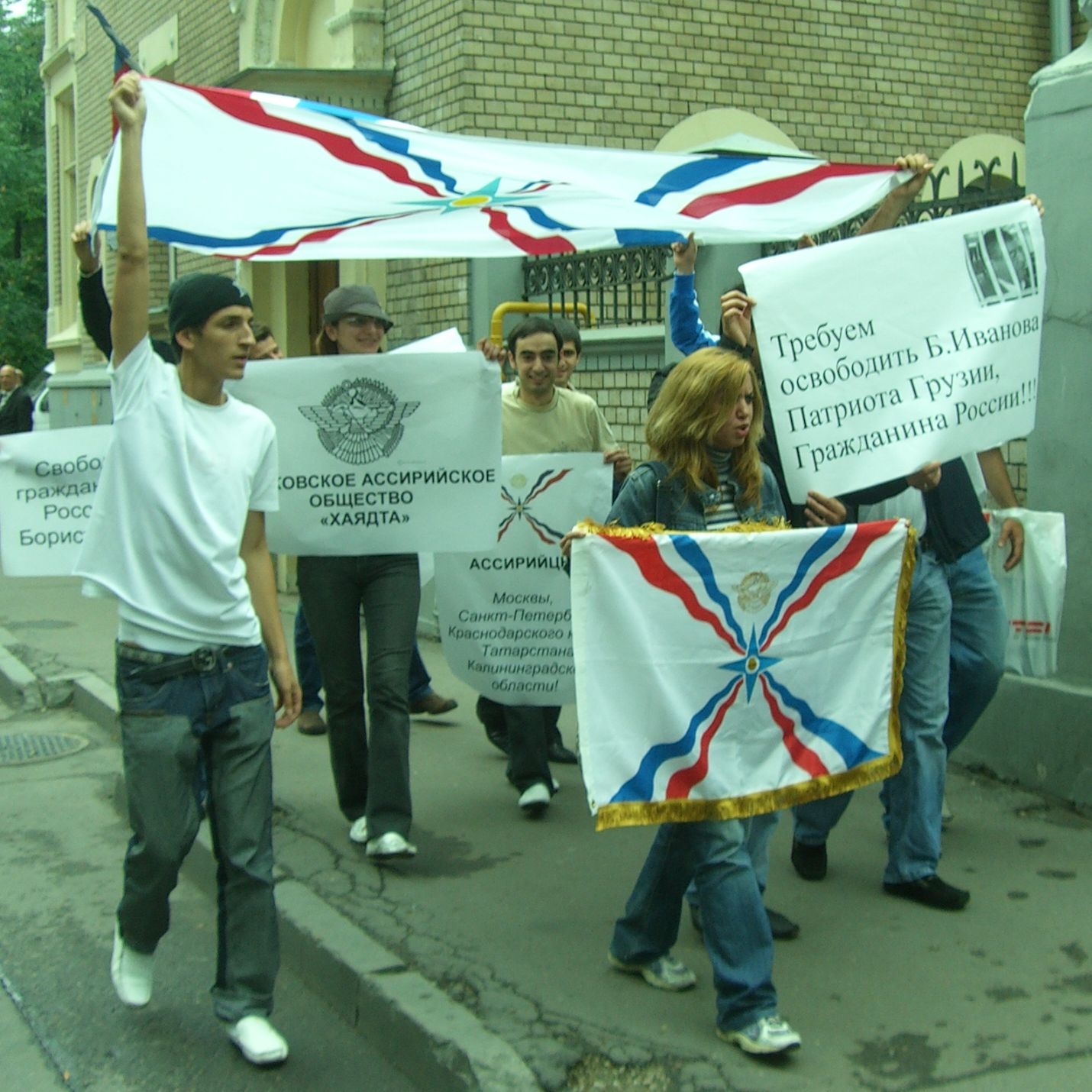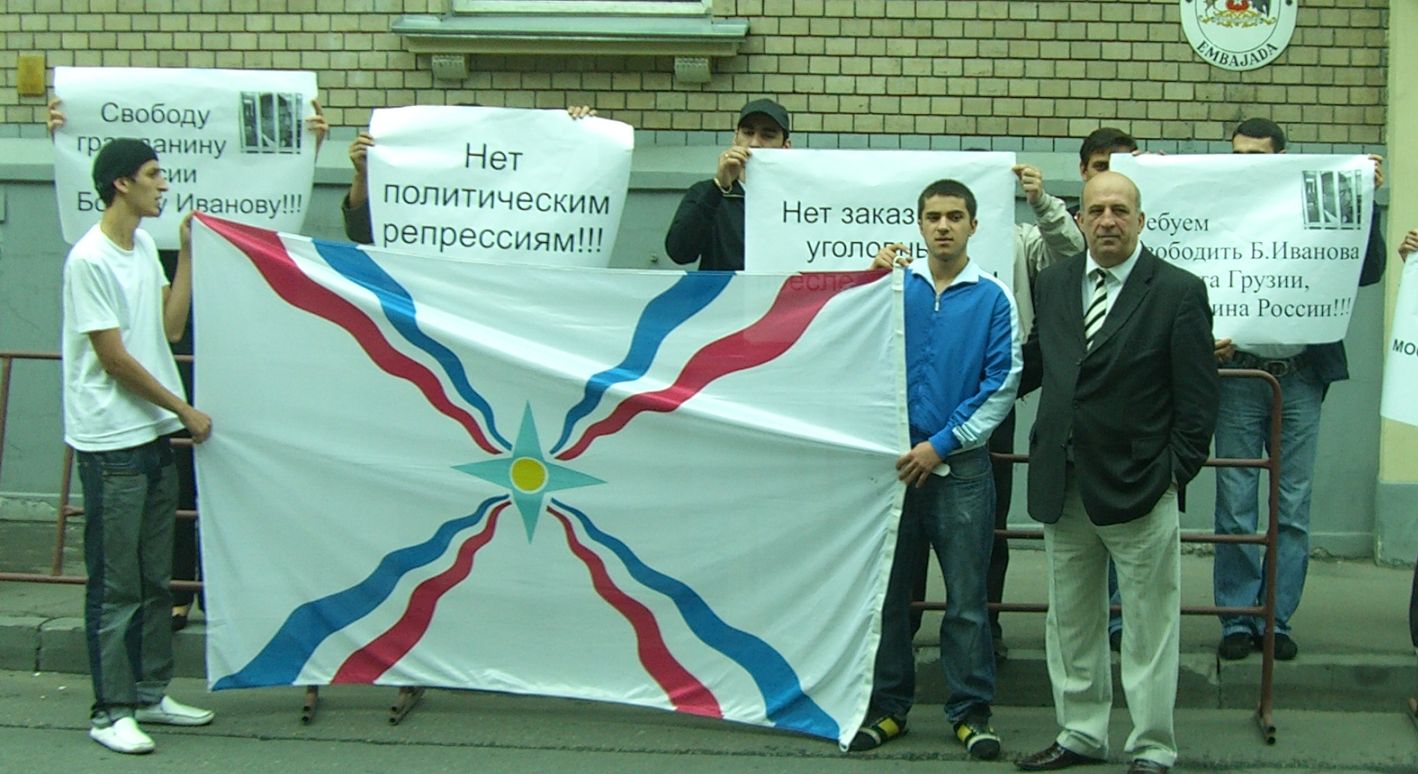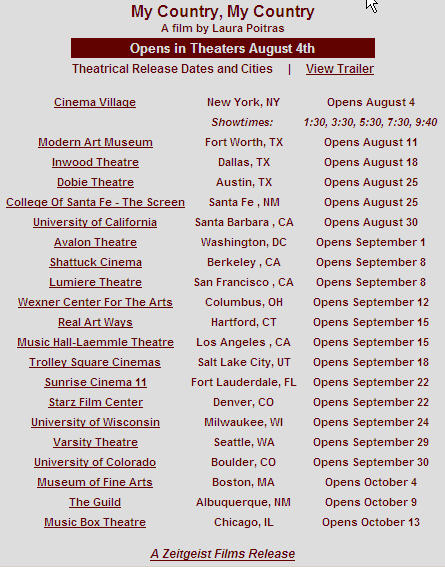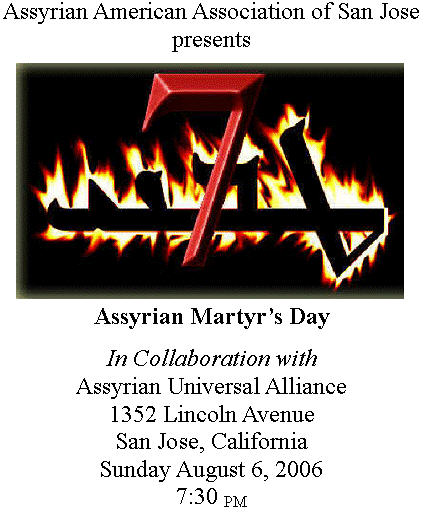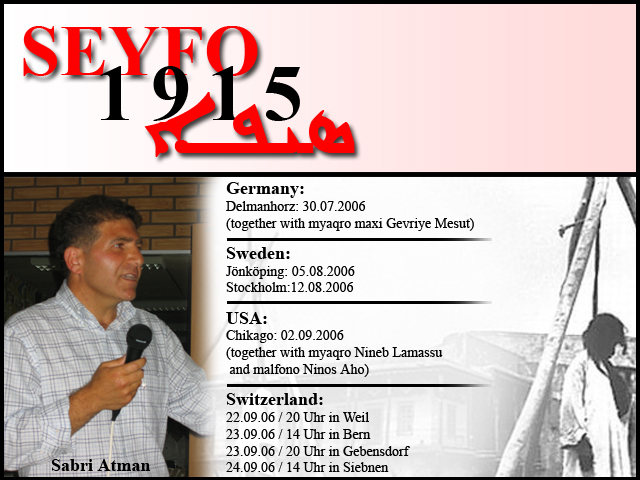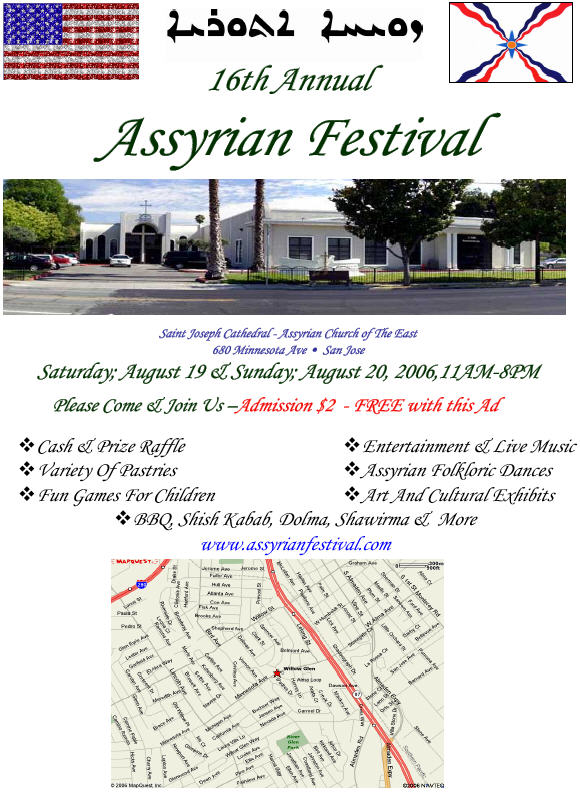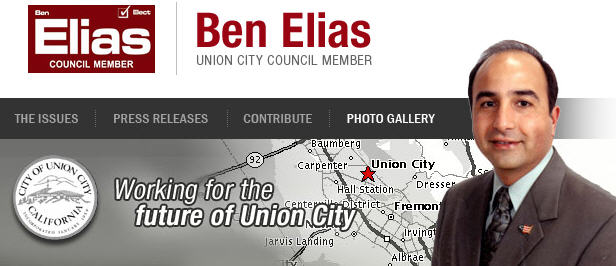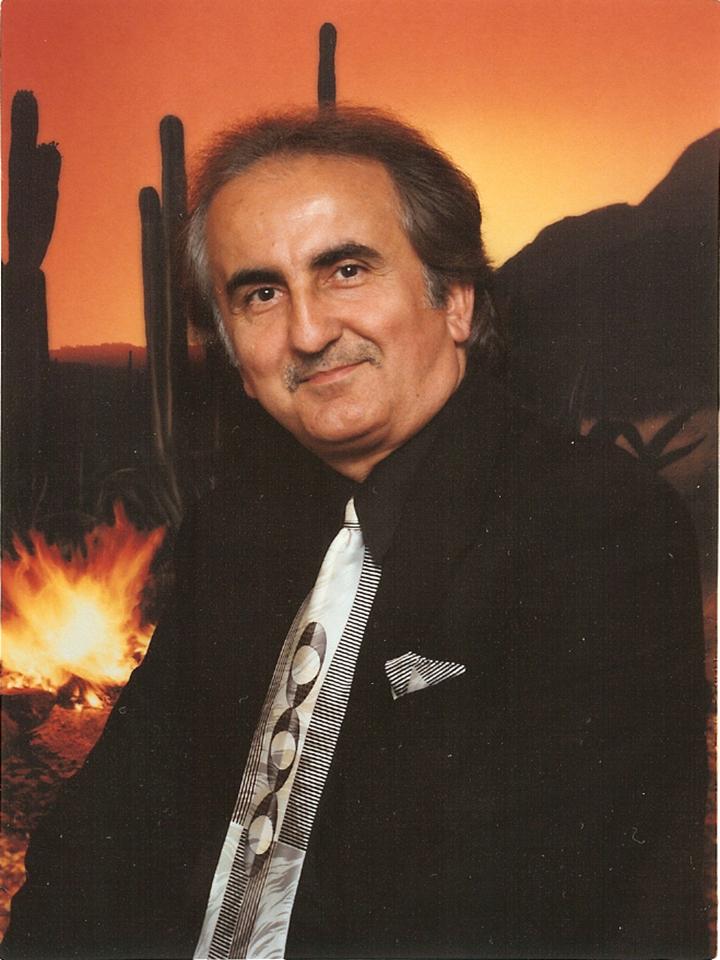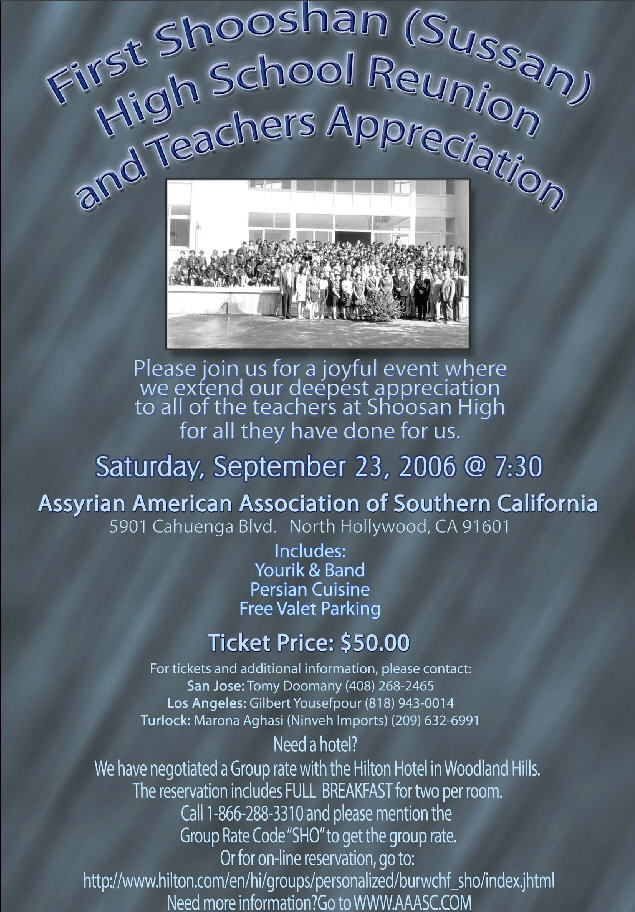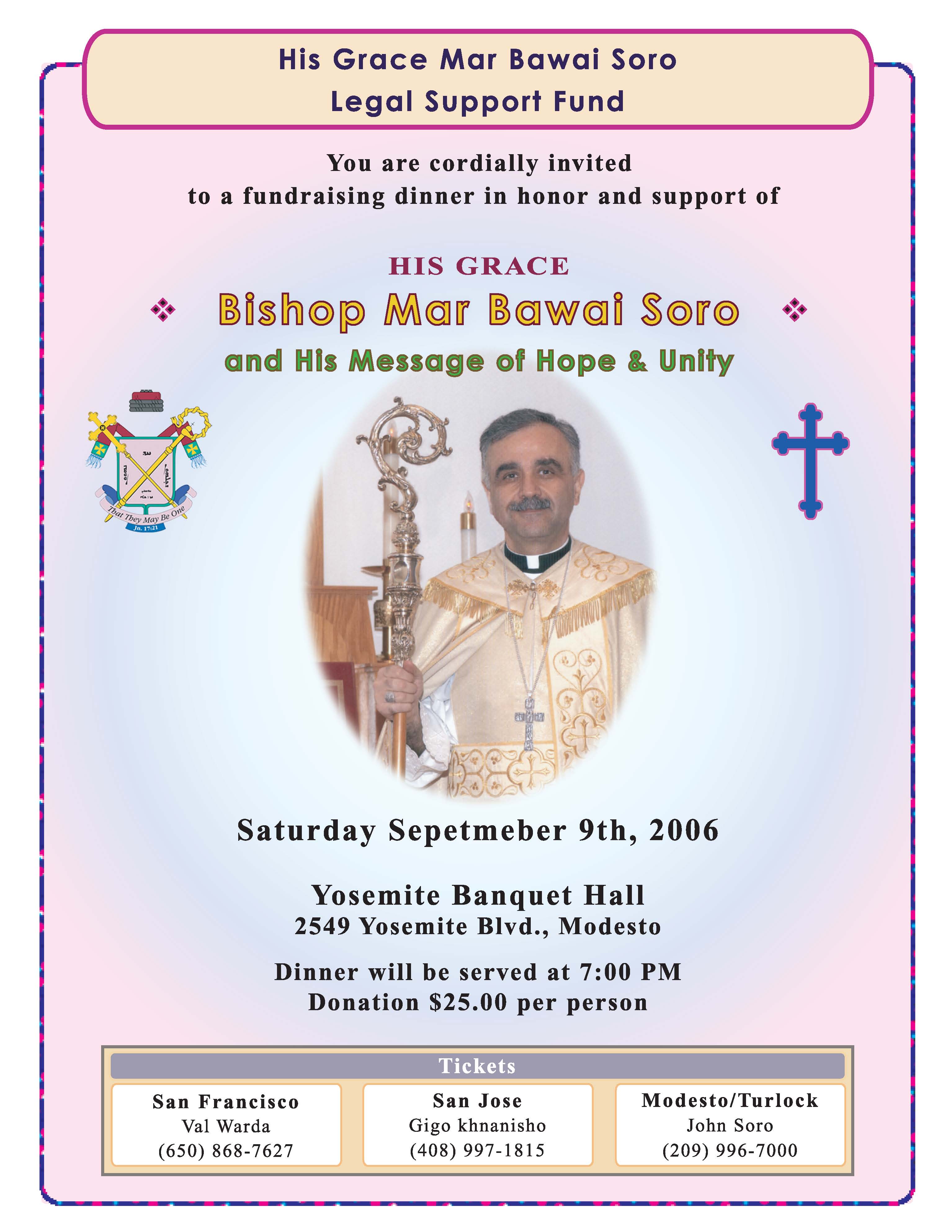|
Volume XII |
|
|

1- 8 6 6 - M Y Z I N D A
|
1-866-699-4632 | Fax 1-415-358-4778 | zcrew@zindamagazine.com
1700 Pennsylvania Avenue. NW Suite 400 Washington, DC 20006 U.S.A. |
|
|
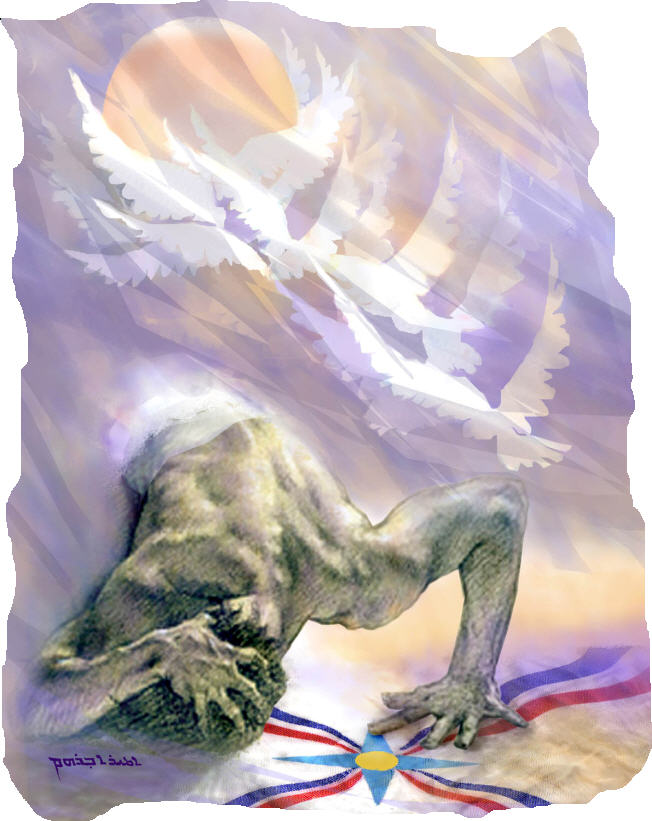
Amir Avrahim, 2006, Baghdad
|
107 - 339 - 448 - 519 - 615 - 650 - 661 - 686 - 737 - 852 - 873 - 884
So Costly a
987 - 1014 - 1020 - 1072 - 1231 - 1258 - 1261 - 1268 - 1285 - 1288
Sacrifice upon the
1289 - 1295 - 1297 - 1310 - 1324 - 1361 - 1369 - 1578 - 1743
Altar of Freedom
1829-1832-1842-1860-1895-1914-1915-1918-1923-1930-1933
August 7
1945-1962-1969-1975-1980-1993-1994-1995-1997-2003 |
Click on Blue Links in the left column to jump to that section within this issue. Most blue links are hyperlinked to other sections or URLs. |
|
|
Neo-Assyrianism & the End of the Confounded Identity |
Wilfred Bet-Alkhas |
|
|
Zinda Magazine's List of Assyrian Graduates 2006 |
Zinda Special |
|
|
Baghdad Bishop says Half of Christians Gone since Invasion
Turkey Breaks Ground on Tigris River Dam Project
First Communion in Mosul, where Shots Became “Fireworks”
Miss Iraq, a Christian, is Missing
|
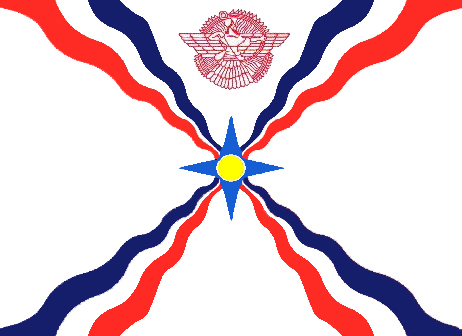 |
|
|
As the Iraq War Fades, So Does the Assyrian Cause |
Mariam S. Shimoun |
|
|
Assyrians in Russia Petition for Release of Boris Ivanov
AUA Statement on the Occasion of the Martyrs Day
ANA Appoints Ibrahim Behnam as Spokesperson
Assyrian Reaches Top-10 on New Zealand Idol
Assyrian Student, Friend Design Pocket PC Referee Assistant
More Trouble for Chaldean Club in El Cajon |
|
|
|
|
|
Why Ask Israel to Stop?
ZOWAA’s 4th Conference Attendees Address Chicago Public
Questioning Zinda Polls
What Happened to Humanity?
The Whole Story of the Evacuation
Naqoosha Radio Now Live Online!
Once A Bishop, Always A Bishop |
Click to Learn More :
ZINDA CALENDAR
ZINDA ARCHIVES |
|
|
A Film on the Assyrian Genocide: Sayfo, the Elimination
In the Beginning: Bibles Before the Year 1000
Naqoosha Radio Now On Air !
Karaoke Party in London |
|
|
|
The Minority Syndrome!
The Great Assyrian Exodus of 1918 |
Ken Joseph Jr.
Eddie S. G. Beth Benyamin |
|
|
Mili Mili World Music Project |
Kristina Assouri |
|
Zinda Says
An Editorial by Wilfred Bet-Alkhas
|
Neo-Assyrianism & the End of the Confounded Identity
For the last few years we engrossed ourselves in endless debates defending one name over another, defending the use of a compound name, ridiculing the "other" names, and in every step of the way fomenting more hatred and disunity. We have even created new names never used before, names we believe are historic and genuine, names that we feel better describe us and our aspirations. At the end, we are left more confused and less known to ourselves and worse yet, to the outside world.
At every corner where two or more of us strike a conversation about our political condition we immediately howl our indignation about our inability to reach a consensus on this issue. After so many years of futile debating and no clear direction from our national leaders the civic outcry and our public wrath has now turned to national fatigue. The chaos has numbed our minds.
What do we call ourselves now - Chaldo-Assyrian? Chaldean-Assyrian-Syriac? With how many more combinations can we declare our identity and be able to solemnly pull ourselves up to a full political stature, next to the Kurds, Turkoman, and Arabs of Iraq? Must we banish the name “Assyrian” from the myriad layers of our memories as an undignified political name?
The last few years were an excellent example of how a few screaming perplexed individuals can throw the masses into a panic. For the screamers, as myself, numbers mattered more than the name. We believed that once we gained a political foothold we would then have an opportunity for reconciliation. This was a new approach, an alternative to what was once called “Assyrianism” – which in its most basic form refers to an accommodation tactic. It goes something like this: we are all of one nation and Assyrians are also known as Chaldean and Syriac. The followers of “Assyrianism” object to any change in the political identity of this nation as “Assyrian”, yet they allow the use of the terms “Chaldean” and “Syriac” to include the undecided populations. In 2003 the leadership of the Assyrian Democratic Movement and a few other parties and churches decided that “Assyrianism” was not the norm in today’s Middle East and a new approach had to be followed in dealing with the demands of the Americans in Iraq. Ambassador Bremer expected that all Christians be identified as one.
When in October 2003 in Baghdad a group of representatives of several parties and churches chose to call themselves "Chaldo-Assyrian" the name seemed like a suitable description. It was initially praised as a mechanism of unity, but soon after it was derided as the source of all historic inaccuracies. The main reason for the rejection of this name was that it paid tribute to the influence of the Chaldean Catholic Church and consequently, the Vatican. And “Assyrians” following the direction of their “Patriarch of the East” would not have this.
To the Chaldeans (or more appropriately the Catholics among us) the name Assyrian means anti-Catholic, Nestorian, and antipapal. Because of their historic significance, both Assyrian Church of the East and the Chaldean Catholic Church fought equally hard to keep the words “Assyrian” and “Chaldean” separate.
The result of this “religious feud” was costly. The Assyrian Church of the East was determined to eliminate any pro-Chaldean voice as far as banishing the most promising leader in today’s rank of its bishops, namely Bishop Mar Bawai Soro. The political ramifications of the Church’s anti-Chaldean movement was even darker. The Assyrian Democratic Movement which has been the most ardent supporter of the compound name was also rejected by many Assyrian voters in Iraq’s national elections in January 2006. A vote for ADM was explained by the pro-Church of the East media as a vote against “Assyrians” and for the Vatican in Mesopotamia.
Ironically, the “Chaldeans” did not come to the rescue of the ADM and the pro-unity groups. While the Assyrian groups in Chicago and Arizona continued to swiftly change the names of their associations and building to “Chaldo-Assyrian”, the “Chaldeans” in Detroit and San Diego hardly moved an inch from their original position. No buildings, clubs, parishes were re-named. To add fuel to this ancient fire, the new proposed cultural club and museum in Detroit were named “Chaldean” only. The Assyrian compromise had changed nothing; and nothing was all that Assyrians are left with today. Assyrians were once again betrayed.
We have now reached a new phase in our search for common grounds, one that respects the reality of hundreds of years of arabization and false social indoctrinations guided by our church leaders, in turn bullied by the Moslem rulers.
After a stormy seven-year debate on the name issue, we now recognize that as long as we recognize the authority of our churches above and beyond our national and political rights, the Catholics and the Nestorians among us will never allow a designation that would best suit our political aspirations. Today, only a very few of us seem pleased by the compromise, which merely sanctifies what other politicians and national leaders before us have been noting all along.
The fact remains that throughout the last seven years and the last 150 years for that matter the name Assyrian has always been attached to our political ambitions in the Middle East. Any time, any one of us from any of our church and tribal groups targets a political goal we present our case as Assyrians, Chaldean-Assyrians, or Syriac-Assyrians – making a connection to our “Assyrian” heritage.
This is because our politics have always been Assyrian. Men like Naom Faiq and David Perley emerging from a “Syriac” or “Jacobite” background understood this as well as our Chaldean heroes, General Agha Petros d’Baz and the late Chaldean Patriarch Mar Raphael Bidawid. Unfortunately in the last decade, our politics have been successfully overrun by Chaldean businessmen, Assyrian usurpers, and patriarchs in bed with the Kurdish and Arab leaders. The concept of unity is benefiting the rich looking for business opportunities in Iraq, while the poor leave Bet-Nahrain in thousands.
The name, Chaldo-Assyrian, found favor only with the students, supporters of the Assyrian Democratic Movement, and those who despise the influence of the churches in our politics. The students prefer it because it sounds progressive, experimental, and original. The term “Assyrian” to the iPod-generation sounds old and stuffy. Nevertheless, these sponsors of the compound name do not necessarily form a formidable support group for the pro-ChaldoAssyrian voices. Usually they are rejected as naïve, anti-Church, and pro-Zowaa. In turn, the “Assyrian only” group is always quick to correct those who refer to the group by any other term. The “Chaldean only” group is omitted as favoring the Chaldean Church supremacy and “Vatican over Nineveh”. Finally, the “Syriac only” backers are often perceived as slaves to the Arabist bishops and patriarchs of the Syrian Orthodox and/or Catholic Churches, who see themselves as Christian Arabs with a different “Christian” language. The same argument is also associated with the Chaldeans in Iraq.
To the Chaldean purists, the name “Assyrian” conjures up images of “heretical” Christians who detest the ascendancy of Vatican in the Middle East. The Syriac sticklers are less critical of the Assyrian view of the Vatican, yet they decry the Assyrian “political” notion of “I was here first and you are me” attitude.
What is interesting is that at one point in time all of us were there first together, all of us detested the ascendancy of anything but our own ambitions, and had a common adversary who professed a different faith and looked upon us as infidels. How ironic that our Churches, in order to survive in the sea of Islamic extremism, so successfully divided us in a way that our singular ambitions would not result in our total annihilation. Today, we exist as ghosts from a distant past, while our comatose bodies subsist only to provide for our churches.
Taking a new name is a quintessential Middle Eastern act. There were no “Iraqi” citizens before 1920s, neither were there any Iranians in the 1800s. They were either Arabs or Persians. The same goes for nearly all other ethnicities in the Middle East. In our case, the Church of the East was at one time called the Church of Persia or the Nestorian Church. In fact many “Nestorian” bishops despised the name “Assyrian” well into the 20th century. There was no Chaldean Catholic Church before 1552 and the Syriacs were called Jacobites.
The notion of “Assyrianism” starting in the late 1940s which culminated in the founding of the Assyrian Democratic Organization (Takasta) and the Assyrian Universal Alliance (Khoyada) in 1968 was our undeniable answer to the mass confusion built by our churches for hundreds of years. However, it did not prove to be a match for the Baathist arabization policies and the pro-Kurdish Assyrians working directly with the fighters in north Iraq.
What we did in 2003 was an experiment to build consensus. But we miscalculated and the experiment failed. Now we have no true “independent” voice in the Iraqi cabinet ministries and we are spoken to through a single-person representation, similar to that we have in the Islamic Republic of Iran. The experiment initiated three years ago in Baghdad failed, because it was connected to the proud and unequivocal voice of the Assyrian Democratic Movement, and ADM was incapable of producing a consensus even among the Assyrians in the Nineveh Plain. In the Diaspora, neither the churches nor other political parties desired an elevation in status for Zowaa in Iraq. The enormous popularity of ADM was quickly crushed after the appointment of Yonadam Kanna to the 25-member Iraqi National Council in 2003. Some among us preferred a disunited population over the authority of a political group in Iraq. Such political immaturity is the firewood for the increasingly dangerous domination of our churches over our politics.
For many of us, the choice of a word by which others will know us has a special significance. We can be called Syriac because we speak Syriac or belong to the Syriac(n) Orthodox Church. We may be proud of our religious affiliation and connection to the Vatican and declare ourselves “Chaldean” (last time I checked there were not too many Chaldean Pentecostals in Detroit). However, when we feel a connection to the Might that was Assyria, 150 years of uncompromising nationalism, struggle against arabization and now kurdofication, the genocides and the massacres, we kneel down before one name alone – ASSYRIAN.
This brings us to a very powerful conclusion: in order to realize our political ambitions in Iraq and the rest of the Middle East and to survive the forces of rapid assimilation in the Diaspora, and to bring to an end the classification of our identity as a religious expression, we MUST transform our “Nestorian”, “Chaldean”, “Syriac”, and “Aramean” designations into one overarching POLITICAL identity, embodied in the name ASSYRIAN.
Ours is a struggle for equality with the Moslem majority in the Middle East. As long as we continue to use different or compound names, our status will always remain “religious” and “minority”. This is what our Churches desire the most, for it is in this state – the new Millet system – that they benefit from our undivided loyalty. After all, this continuous skirmish and concern with our name is a clear reflection of our powerlessness before the primacy of our Churches. In this state we shall never find a political solution to our political challenges.
The use of Chaldo-Assyrian, Assyro-Chaldean, Chaldean Assyrian Syriac or any other combination of names establishes a cultural context for separate agenda set by various disconnected groups. This does not bode fairly with a comprehensive national agenda that first and foremost should takes into consideration the establishment of an administrative region for the preservation of a Christian culture rooted in 7000 years of history, the only indigenous ethos in Iraq.
Assyrians, as myself and generations before me, contend that there will always be those among us who will find the names “Chaldean” and “Syriac” as gratifying as “Assyrian”, one that captures their unique heritage. Sadly, these groups and individuals will melt into the Arab, Turkish, and western cultures – believing that our unique “Christianity” will save them from the external cultural and biological forces. Nothing could be further from the truth.
The names “Syriac”, “Chaldean”, “Nestorian”, and “Aramean” belong to all of us and no one can deny us these attributes of our unique identity. Yet in order to survive and propagate within a Moslem majority, we must adopt a POLITICAL identity in addition to our cultural, religious, and linguistic characters. This can only be defined in our Assyrian self, a self that must not be redefined by any other appellation. In her presentation to the Congressional representatives in Washington a few weeks ago (click here), Ms. Rosie Malek-Yonan challenged the lawmakers to pay close attention to the plight of the Assyrians. She skillfully assembled all our religious and ethnic groups under one name – Assyrian – and presented all our problems as the challenges faced by one nation and one people. Ms. Malek-Yonan spoke for every Syriac and Chaldean, Nestorian and Jacobite, Aramean and even Maronite who considers him/herself connected to the Assyrian future. All our political leaders ought to follow suit.
Our Moslem neighbors are quite aware of our internal struggles and prefer that we use a name other than “Assyrian”. They view this issue differently and more broadly. Because to a politically savvy person, the term Assyrian implies one thing only – a claim to a territory.
Geo-politically speaking, the terms "Assyrian", “Syriac” and “Chaldean” refer to those individuals who claim to originate from "Assyria", “Syria” and “Chaldea”, respectively . Syria is a modern Arab country created in the 20th century and "Chaldea" is a geographical region that lived only in the minds of the Jewish writers of the Bible. There exist no ancient tablets from Mesopotamia that show a specific region south of Babylon that was called "Chaldea". In fact, the "Chaldean" rulers referred to themselves as rulers of Babylon. The correct name of the region used by our forefathers was Babylon(ia) or Sumer. The name “Assyria” is rooted in history, can be traced via existing documents back to millennia B.C., all through modern times. After the fall of Nineveh in 612 B.C., Greeks and Romans used it, so did the Persians, the Turks, and even the Vatican - who chose to use the name "Chaldean" to distinguish Assyrians following the Roman Catholic faith from Assyrians adhering to the ancient church of the East theology.
If we use “Assyrian” for political ambitions, then should we let go of our other names?
This brings us to a growing sentiment among the Assyrians of different religious and linguistic background – one that is built on the notion of “Assyrianism”, but goes one step further to the left. This new radical movement, one that this author believes is the fitting solution to our current social and political maladies, can be best described as the New Assyrianism or Neo-Assyrianism. The followers of this movement, as myself, believe that Assyrians have done more than their required share of concession-building and have compromised much of their status to accommodate the religious factions within. For a neo-Assyrianist there is only one answer: accept the name "Assyrian" with no conditions attached.
The Neo-Assyrianists believe that the accommodative nature of the classic “Assyrianism” and the pro-“Chaldo-Assyrian (Syriac)” ideologists have relegated this nation to a weaker position, rendering us powerless and incapable of negotiating a tenable future for Assyrians in Iraq or elsewhere in the Middle East. The fact remains: only Assyrians will continue to bear the burden of conveying the will of the majority – regardless of their religious and linguistic backgrounds – and recognize the terms Chaldean, Syriac, Aramean, and Nestorian as the jewels of the Mesopotamian treasure we have inherited – without which our family portrait will never be complete. Only Assyrians maintain a parental obligation to ensure the survival of the various linguistic and religious delineations within our nation.
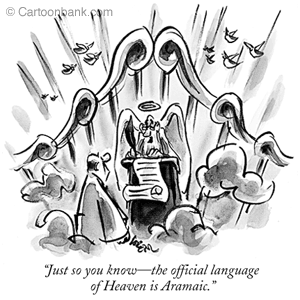 |
| St. Peter talking to a dead man. Published in The New Yorker, July 24, 2006. |
No longer is it necessary to justify the use of the name "Assyrian" and none of us should misuse more of our precious time to validate the existence of the Assyrians. Assyrians exist. Period. We exist as members of different church groups, speak various dialects, and are proud of our colorful mosaic of ethnic, religious and linguistic identities. Any other designation and objective is simply doomed to disappear within the Arab, Kurdish, and Turkish dispositions.
No more concessions, “also known as”, slashes and dashes, re-writing of our history, and negotiating the terms of our rightful inheritance. Assyrian it is !
The neo-Assyrianists hold a crucial dice in their weary hands. With all these designations in our possession, we hold six unbeatable numbers and in the hands of our experienced players the dice can fall on the side that would create the greatest advantage in dealing with our Moslem neighbors. And as long as our players know themselves as ASSYRIAN and remain detached from religious and tribal affiliations, what is written on the sides of the dice will remain a subject of conditional proclivity, favoring the survival of our unique Mesopotamian, Christian, Aramaic culture.
Welcome on-board the speeding train of Neo-Assyrianism ! Next stop…Nineveh.
 A new Zinda Magazine policy: in a follow-up to the precepts of the New Assyrianism as described in the above editorial, Zinda Magazine will no longer use the compound names, slashes and dashes, or "also known as" phrases to identify the Assyrians and the sub-groups therein. However, our writers and contributors are - as always - free to use other terms in the future. Their views do not represent the views of the editors of Zinda Magazine. A new Zinda Magazine policy: in a follow-up to the precepts of the New Assyrianism as described in the above editorial, Zinda Magazine will no longer use the compound names, slashes and dashes, or "also known as" phrases to identify the Assyrians and the sub-groups therein. However, our writers and contributors are - as always - free to use other terms in the future. Their views do not represent the views of the editors of Zinda Magazine.
 Click Image to Enter
Click Image to Enter |
A Lamassu Productions Project
|
|
|
|
The Lighthouse
Feature Article
|
Zinda Magazine's List of Assyrian Graduates 2006
Congratulations Class of 2006 !
Student |
School |
Residence |
Major |
Degree |
And then... |
Salim Abraham
|
Columbia Univ in New York
|
Syria |
Newspaper Journalism |
Masters |
Thesis: Syrian expatriates who oppose the Baath Party rule in Damascus; special correspondent to Associated Press in Syria; Zinda Crew |
Dr. Manfred Alkhas |
Western Seminary |
San Jose, California |
Divinity |
Masters |
Dr. Manfred represented his class at the graduation ceremony. |
Nisha Aryo beth Arsan |
Gymnasium in Oldenzaal, Holland |
Holland |
|
High School Diploma |
In September, Nisha will begin studying Political Science at the University of Nijmegen in Netherlands |
| Shamoe Ashorian |
University of Toronto |
|
Civil Engineering |
Bachelors of Science |
|
Stephanie Begini |
John Burroughs High School |
Burbank, California |
|
|
|
Sharokin Betgevargiz |
Boston University |
Connecticut |
Graphic Design |
Masters in Fine Arts |
To Exhibit her work at College Art Association
|
| Waleeta Canon |
George Washington University |
|
Public Policy & International Development |
Masters |
|
Jill David |
Pitman High School |
Turlock, California
|
|
High School Diploma |
Jill will be attending Westmont College in Santa Barbara, California to study Religion Study/Theology. |
Jacques Kas |
Ecole de Management Léonard de Vinci |
Paris, France |
Management & Technologies |
Bachelors |
Received his diploma from Charles Pasqua, former French Minister of Interior Affaires, Senator, and now President of the Pôle Universitaire Léonard de Vinci. |
| Shamiran Mako |
York University, Toronto |
Ontario, Canada |
Political Science & Political Thought |
Bachelors with Honors |
Shamiran will begin Masters in Political Science and International Relations in the Fall at the Wilfred Laurier University in Ontario, Canada |
| Allhan Oraha |
University of Toronto |
|
Pharmacology |
Masters of Science |
|
As Zinda receives more information from our readers more students' names and information will be added to this list in the coming weeks.
 |
Jill David, Turlock, California plans to study Theology. |
Prof. Sam Freedman in his evaluation of Mr. Salim Abraham' work:
"Salim Abraham has deeply impressed me with his masters project. He took on an extremely ambitious topic, profiling a Syrian exile who is a leading advocate for regime change by force, and he reported it with relentless energy and unceasing intelligence. Although almost every source of consequence lived outside New York the dissident, Farid Ghadry, in suburban Washington, and other important opposition figures in London and Damascus Salim undertook innumerable interviews in person and by telephone and email. He spoke at length with scholars from universities and think tanks, human-rights activists, and former diplomats. I was particularly struck by Salims thoroughness because he had never lived in the United States until enrolling at Columbia. Yet he out-hustled virtually every American-born student in my cohort of masters advisees."
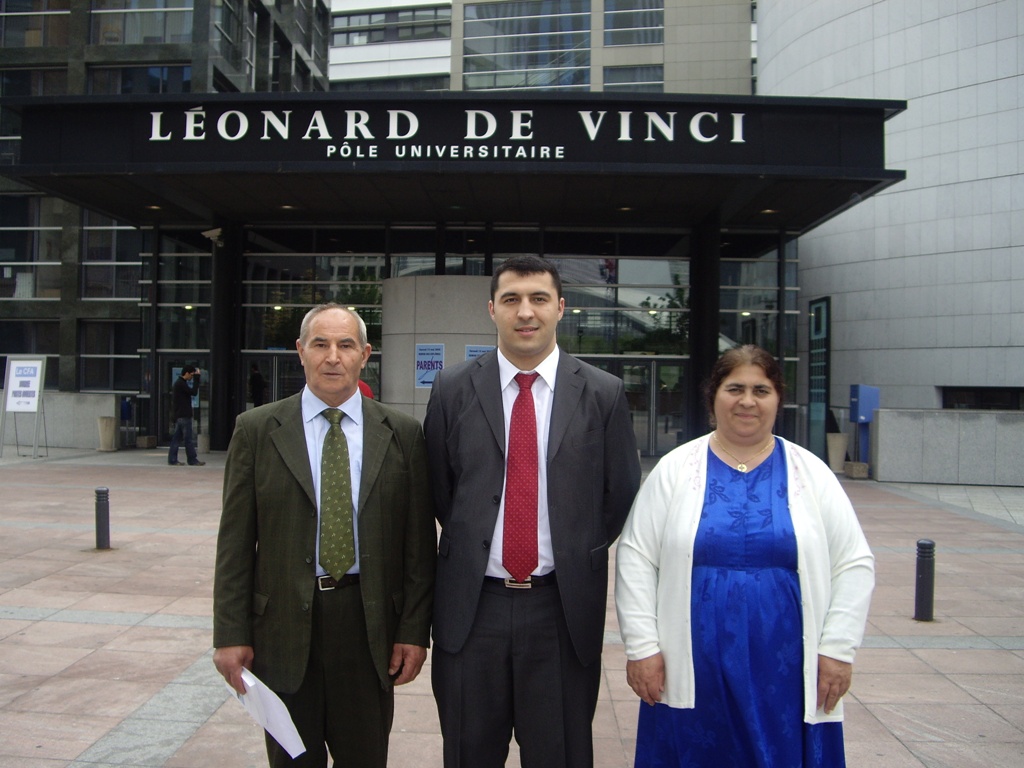 |
Jacques Kas and his proud parents in Paris on his graduation day |

|
|
| |
The Assyria Advocate
with Mariam S. Shimoun
|
|
As the Iraq War Fades, So Does the Assyrian Cause
The United States is doing a great job of letting go of their total failure in Iraq, the way they let go of the total failure in Afghanistan – a country where the Taliban has rebanded and Kabul is the only city that “President” Karzai actually has influence over.
Assyrians have had 3 years. Assyrians have had 3 years with the world focused only on Iraq, people glued to their television sets to see how many more American soldiers had been killed, civilians murdered, peacekeepers and volunteers kidnapped and beheaded, Zarqawi’s new messages to the “invading infidels”, Sunni and Shia uprisings…we have had 3 years to come together and tell the relevant players what we wanted.
And we have failed, miserably.
Don’t get me wrong – much of the Assyrian agenda has been completed: the agenda to destroy and discredit each other. We have successfully split ourselves according to affiliations with churches, Bishops, and political parties. We have weakened and discredited the only political party Assyrians have in Iraq by soiling their reputations as Baathists, Kurd-lovers, traitors, and thieves – none of which is proven, but of course, once the word is out, it’s out. We have spent three years arguing over which church is right, which Bishop is right, which Assyrian satellite channel to watch, and which Assyrian organizations are “secretly” pro or anti-Zowaa. It’s been fun, really. The Kurds almost have a country, and we’re boycotting church services and demonstrations out of spite and jealousy. There’s even some nut with a TV show in California who has created a weird cult following by ranting about his hatred for Zowaa. All of this in the name of “True Nationalism”.
Congratulations. Hopefully we have gotten the “self-destruction” out of our system, and maybe now we can put egos, anger, and spiteful stubbornness aside and put the nation before out personal affiliations. How bad does it have to get before we stop?
Iraq is over. Israel and Lebanon are the new “in” thing. Assyrians can forget about Iraq getting the news coverage it ever did before. Americans want to forget it, and besides, midterm elections are coming up - who needs an American war to bring down everyone at the party?
You can count on Kurds seizing the opportunity to reign in their power, distance themselves from the Iraqi central government, and complete their Kurdification campaign of Assyrian villages and people. And if Turkey invades, which is sounding pretty likely, will Assyrians be prepared to handle what follows? Or will we send Patriarchs to handle our political aspirations then, too?
The arrogance of the West in Middle Eastern affairs has been harmful, destabilizing and a complete disaster for Assyrians. It didn’t have to be, of course. Had the “civilized, democratic minded, progressive” Western powers behaved only slightly less self-interestedly, and taken into account that people’s lives and future were at stake, instead of just an oil supply and regional hegemony, Assyrians may have avoided the near-extinction they face in the Homeland today.
But it isn’t just the West’s fault. Assyrians have weakened their institutions so much they have become handicapped. Once again, those who have trusted the churches have been burned. The only legal protections, recognitions, media coverage, and attention the Assyrians have received in Iraq has been thanks to the non-religious, Assyrian institutions that are operating on pathetically small budgets, but are packed with Assyrians determined to work in spite of the destructive forces of our religious clergy and token “Kurdish” Assyrians. While we argue about who and what we should make alliances with – we are not realizing that like it or not, policies are in place already. Let’s learn from mistakes and move with political caution.
Empires rise and fall, 100% of the time. I am bored with the U.S. and Israel (and so is the rest of the world, it seems) and as empires become weak, their economic and diplomatic powers are quickly replaced with severe military actions to persuade their enemies and maintain their power. Not only have Assyrians had to historically survive the Islamic agenda, and pre-Islamic invasions, but now they have the self-interested arm of the United States reaching in to liberate them from Saddam, and hand deliver them to the Kurds and Islamists.
So thank you, America, for getting rid of Saddam. The people benefiting most are the Kurds – a displaced Turko-Persian people who belong in the Caucus Mountains, not the Assyrian villages they now occupy.
It is important for all of the political parties to take a step back and audit themselves, figuring out their weaknesses and strengths. What have been your failures and your successes in the last crucial 3 years, and what is necessary to change, evolve, and meet new needs for Assyrians. Always keep in mind you do not exist for your own perpetual survival: You exist to represent the Assyrian nation. While it is politically important to maintain the stance in Iraq of being Iraqi nationalists, perhaps you should take “Iraqi nationalism”, step for step, as seriously as, say, the Kurds do. Prepare for Iraq to stay one country. Prepare for Iraq to split.
Whether we Assyrians in the Diaspora like it or not, we have to start paying attention to the needs of the Assyrians remaining in Iraq, and those who have fled to neighboring countries – something even the U.N. and other D.C.-based NGO’s are recognizing as a humanitarian problem. When the Wall Street Journal runs a front-page story about Assyrian abductions in Iraq for ransom money, it SHOULDN’T be the first time you hear about it. Assyrians need, above all else, personal security – something perhaps our political parties can begin looking into providing. They also need homes, schools, financial aid, medicine, and anything else they tell us they need. If villages are rebuilt, then maybe those who have fled recently can return.
Also important: leave the churches be. Let them have their fight. Our Patriarchs, Bishops, and priests - and by “our” I mean the Assyrian Church of the East, the Assyrian Chaldean Catholic Church, and the Assyrian “Syriac” Orthodox Church (Jacobite) – have been paid off, silenced, played and dealt, and they have personal power issues that are tiring, damaging, selfish, and completely distracting. For the last 3 most important years they have taken our attention away from Assyrians in the Homeland, and focused it on themselves. So let’s stop feeding their habit and start looking away from them for a change, and toward the future of the nation they have worked so hard to divide and conquer. I once wrote that the scariest image for the KRG would be an alliance between Assyrian factions, agreeing to disagree but to work together for Assyrians; I now say the scariest image for our churches is their parishioners, freely and happily joining in nationalist brother and sisterhood, ignoring their cries of “treason” and “excommunication” in order to work toward survival of our people.
To the Assyrian readers (by “Assyrian”, I am referring to those who call themselves “Assyrian” regardless of religious denomination) - let the “Chaldeans”, “Syriacs”, and “Arameans” be. Let them go. We are not beggars, we have been too busy trying to be all inclusive and those powers that have worked so hard to divide us and distract us have succeeded. The “Syriacs” and “Chaldeans” have too much money and time on their hands for Assyrians to argue tirelessly with them – to history, they will always be Assyrian, to Assyrians, they will always be Assyrian. Let them call themselves whatever they like. Assyrians are the only ones who are working for ethnic and land rights, and as long as we keep our eye on the prize we will succeed. Let the “Chaldeans” et al. go. Those who want to join ranks, will. Those who want to listen to logic and history, will. When Assyrians have secured their rights on their indigenous lands, Assyrians will live in peace, and the rest can be absorbed into their Arab and/or Kurdish rulers. Leave them build their historically inaccurate museums and write their propaganda-filled books, let their Patriarchs say what they like – the more we fight them, the more validation we give them to garner support as “anything but Assyrian” to their parishes and Kurdish funders. So let them go. Kurds, Arabs, and now “Chaldeans” and “Syriacs” have always tried to claim the Assyrian civilization as their own to make up for their historical shortcomings, fortunately our kings and queens left their testimonies buried underground for the world to know exactly who they were. Jealousy will always breed theft, but again, it is short-lived theft.
For those who want the name Assyrian to die – they have tried to rid the world of Assyrians before. As long as there are Assyrians like me in this world – and there are many – they will not kill this name. Buy the churches, take the “Chaldeans” and the “Syriacs”, Assyrians have survived this before – there is nothing particularly special about the new enemies of Assyria that gives them power to eradicate the Assyrian race.
So let’s remember these lost three years. Let’s not let another year pass before we begin to focus and strengthen our efforts, and sever the ties that bind us.
|
|
Good Morning Assyria
News From the Homeland
|
Baghdad Bishop says Half of Christians Gone since Invasion
Courtesy of the Catholic News Service
3 August 2006
By Simon Caldwell
LONDON (CNS) – Half of all Iraqi Christians have fled their country since the 2003 U.S.-led invasion, said the auxiliary bishop of Baghdad.
An Illustrated History of Assyrian Christianity |
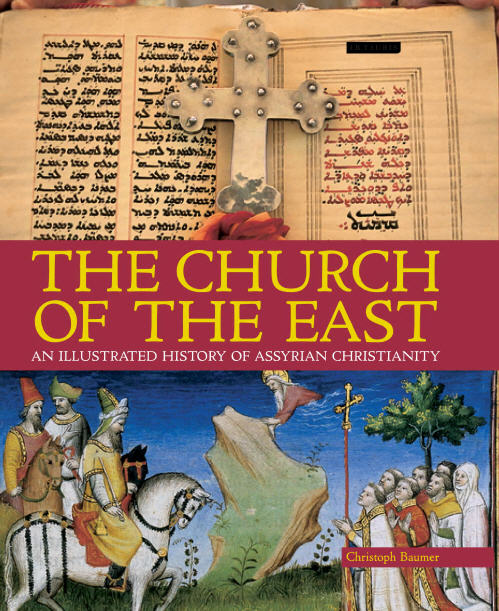 |
20% off List Price for
ZINDA READERS
For a limited period only & only for readers from U.S.
View Zinda Info: Click Here
Click Bookcover to Order Your Copy
Use Promo Code P356ED
when you proceed to 'Checkout'
|
|
Chaldean Catholic Auxiliary Bishop Andreos Abouna of Baghdad said that before the invasion there were about 1.2 million Christians in the predominantly Shiite Muslim state. Since then the overall number has dropped to about 600,000, he said.
"What we are hearing now is the alarm bell for Christianity in Iraq," the bishop said. "When so many are leaving from a small community like ours, you know that it is dangerous – dangerous for the future of the church in Iraq."
The bishop said 75 percent of Christians from Baghdad had fled the capital to escape the almost daily outbreaks of sectarian violence.
Since the beginning of the war, the number of Chaldean Catholics, who make up the country's most numerous Christian denomination, had dropped below half a million from 800,000, he said. Many sought new lives mostly in the neighboring countries of Syria, Jordan and Turkey, he added.
Bishop Abouna said he thought it was unlikely that many of those who had emigrated would return.
Bishop Abouna spoke Aug. 1 from Iraq with Aid to the Church in Need UK, a Catholic charity that supports the Chaldean Catholic community in Iraq. Since he became the auxiliary bishop of Baghdad, Bishop Abouna has regularly updated the charity on the community's situation.
About 97 percent of the country's total 27 million Iraqis are Shiite and Sunni Muslims; Christians make up the majority of the remaining 3 percent. The Chaldean Catholics speak Aramaic, the language of Jesus.
Christians were not being targeted by terrorists any more than other groups, said Bishop Abouna, but the faithful nonetheless felt especially isolated and vulnerable as their numbers dwindled.
He added that many Christians remaining in Iraq were either too poor, old or sick to leave. Priests and religious were also experiencing continuing difficulties in trying to minister to them, he said.
"It is not easy for them (the priests)," the bishop said. "When they want to travel to other parts of Baghdad, they have to be very careful.
"They are doing their best to contact the families and bring them to church," he said.
Many people were unnerved by the lack of security and confidence in the political process that was supposed to usher in a new era of peace, democracy and rule of law following the removal of President Saddam Hussein by coalition forces, Bishop Abouna said.
"The constitution and the political developments of the past 18 months or so have not helped at all," the bishop said. "It is just a theory.
"Everyone is asking: when will the violence stop? They want to rest. They cannot live like this – every day there are these terrible things," said Bishop Abouna.
He said the only thing keeping people going was hope because "the country is rich but lacking stability. Once the stability returns, the country will rise up again."
Turkey Breaks Ground on Tigris River Dam Project, Ancient Assyrian City in Danger
Courtesy of the Agence France Presse
7 August 2006
(ZNDA: Diyarbakir) Turkey has begun building a major dam on the Tigris river, overriding fierce criticism that the project will devastate a millennia-old historic site and displace thousands of Kurds. Prime Minister Recep Tayyip Erdogan joined Saturday's ground-breaking ceremony for the Ilisu Dam outside Dargecit town, 45 kilometers from the Syrian border, marking the start of a project that was first introduced in the late 1970s and has ever since remained controversial.
At the core of opposition to the dam is nearby Hasankeyf (Assyrian Hasna d'Keepa or Hosno d'Keefo), a small poverty-stricken town on the banks of the Tigris, once a mighty city in ancient Mesopotamia, part of which will be submerged by the dam's giant reservoir.
The many critics of the project argue that the dam, to be completed with a hydroelectric power plant, will destroy Hasankeyf's unique heritage which includes Assyrian, Roman and Ottoman monuments and ruin the traditional way of life of its population of ethnic Kurds and Arabs.
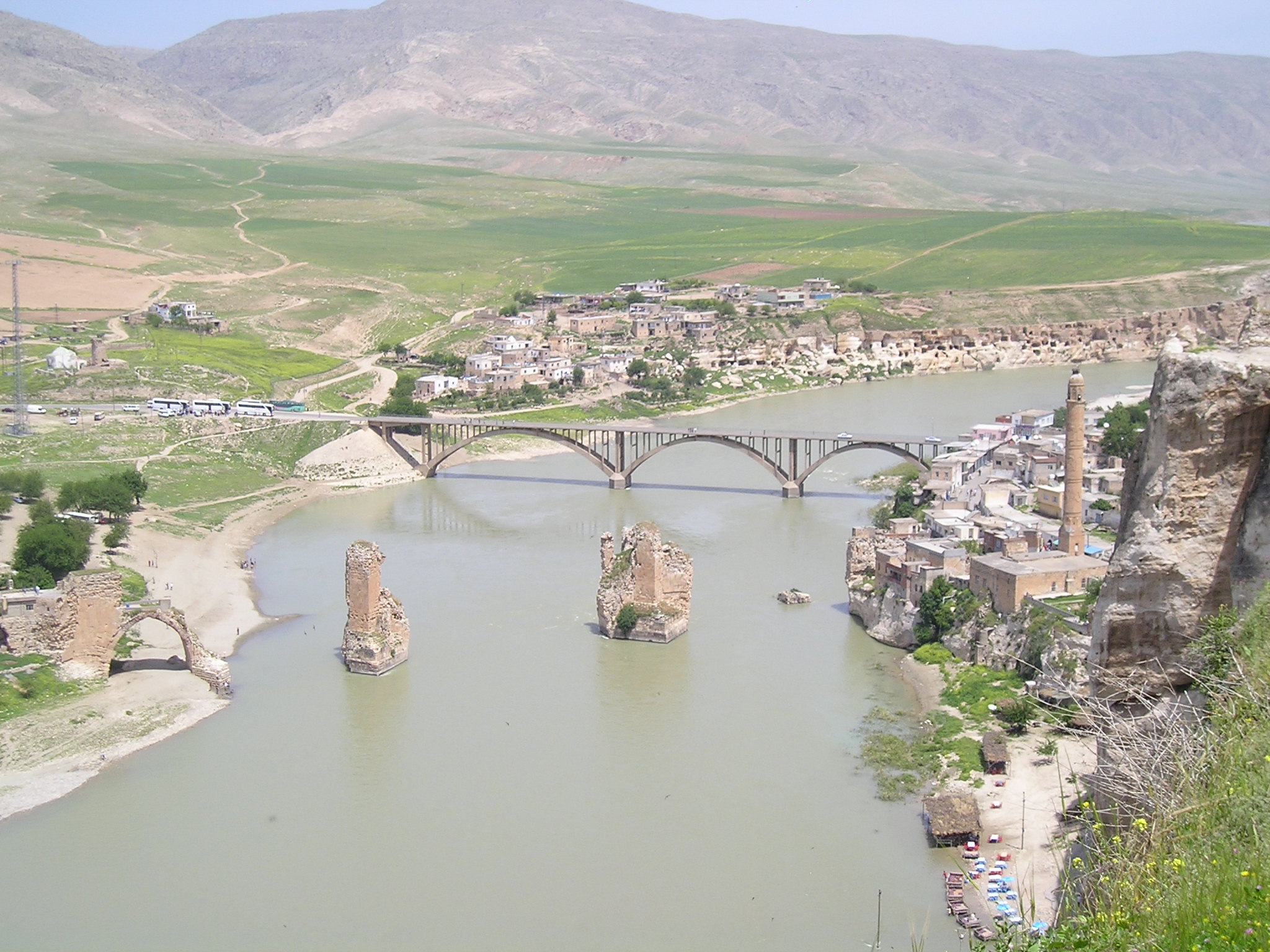 |
| The apple of the eye of eastern and western tribes, Hasankeyf was home to the Assyrians, Byzantines, Sassanids, Umayyads, Abbasids, Hamdanis, the Artukoğlu, Ayyubids, Seljuks and Ottomans. |
In a bid to halt the project, activists have petitioned the Strasbourg-based European Court of Human Rights and urged foreign creditors to withhold loans for the international consortium building the facility.
Supporters counter that the dam, part of a large decade-old plan to boost economic development in the poor, mainly Kurdish southeast, will create up to 10,000 jobs, pave the way for fisheries, irrigate vast areas of farmland and provide vital energy for Turkey's economy.
Erdogan hailed the project as a proof of Ankara's determination to raise the living standards of its Kurdish minority.
"The step that we are taking today demonstrates that the southeast is no longer neglected ... This dam will bring big gains to the local people," he said at the televised ceremony.
Scheduled to become operational in 2013, the $1.55 billion Ilisu Dam will become Turkey's second-largest reservoir and fourth-largest hydroelectric power plant, generating 3.8 billion kilowatt-hours of electricity annually.
Officials say 80 percent of Hasankeyf's archaeological sites - including tombs and hundreds of cave houses, already damaged by nature's impact and years of negligence - will remain above the planned waterline.
The monuments that would be flooded - including mosques, a hammam (Turkish bath) and the remains of an ancient bridge over the Tigris - will be relocated to a would-be open-air museum nearby, which Erdogan pledged would turn the region into a "tourist center."
Erdogan said that $85 million had been allocated for the architectural projects.
The project has triggered protests from Iraq and Syria that Turkey is monopolizing the waters of the two rivers.
First Communion in Mosul, where Shots Became “Fireworks”
Courtesy of the AsiaNews
7 August 2006
(ZNDA: Mosul) Joy and terror sometimes coexist in Iraq where the population is now resigned to daily life amid mortar shots and suicide bombs. This is how the Christians of Mosul, the city’s third largest country, will remember 4 August: as a day of “immense joy” and “terrible panic”. Violent clashes marked the Friday when 80 children of the Chaldean parish of the Holy Spirit received their first Holy Communion. The young parish priest, Fr Ragheed Ganni, told AsiaNews how he turned gunshots into fireworks not to spoil this special day of celebration.
30% off List Price for
ZINDA READERS |
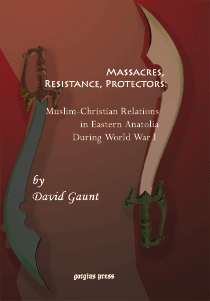 |
Click Bookcover to Order Your Copy |
“We started our celebration at 7.30am,” he said. “The church was packed and everybody was so happy. Suddenly we heard explosions and shots close to the church. Although people are used to it and remained reasonably calm, they started to wonder whether they were going to make it back to their homes or not. I was aware of the immense joy of the 80 children receiving their first Communion so I turned the subject into a joke and said to them: ‘Do not panic, these are fire works. The city is celebrating with us.’ And at the same time I gave them instructions to leave the church quietly and quickly.”
By the time the mass ended, violence had spread throughout Mosul. Nine policemen had been killed in a series of attacks. Three car bombs and as many mines went off throughout the city and police posts came under mortar fire. Military reinforcements were called into the city, both local and US troops. The local administration imposed a curfew until the following day and decided to shut down all the town bridges across Tigris River.
But all this did not shake the peace felt by the community of the Holy Spirit. The parish priest added: “We are glad we were able to conclude the preparation of these children while the city was facing such painful and dangerous circumstances. We feel the prayers of thousands of people accompanying us. United with them, we prayed for peace in Iraq, Lebanon and all around the world.”
Miss Iraq, a Christian, is Missing
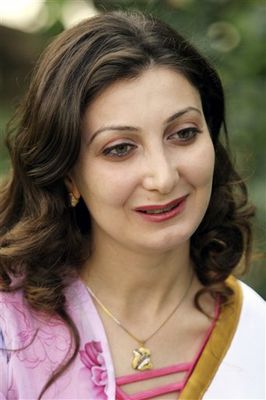 |
| Silva Shahakian, Miss Iraq is missing. |
(ZNDA: Baghdad) Miss Iraq is still missing, or, more accurately, hiding.
Silva Shahakian is an Iraqi-Armenian who won her title by default when Islamic militants reportedly threatened to kill other contestants. She was crowned in Baghdad on 13 April because the initial winner, Tamar Goregian (another Armenian,) feared retribution from militants.
The first winner gave the crown back and two runner-ups didn't want it either.
Organizers hoped to send Miss Iraq to the Miss Universe Pageant in Los Angeles on 23 July. Ms. Shahakian is believed to be in Iraq. |
Back to the Top
|
| |
|
News Digest
News From Around the World
|
|
Assyrians in Russia Petition for Release of Boris Ivanov
Petition of the Assyrian of the Russian Federation
to the President of Georgia, Mikhail Saakashvili
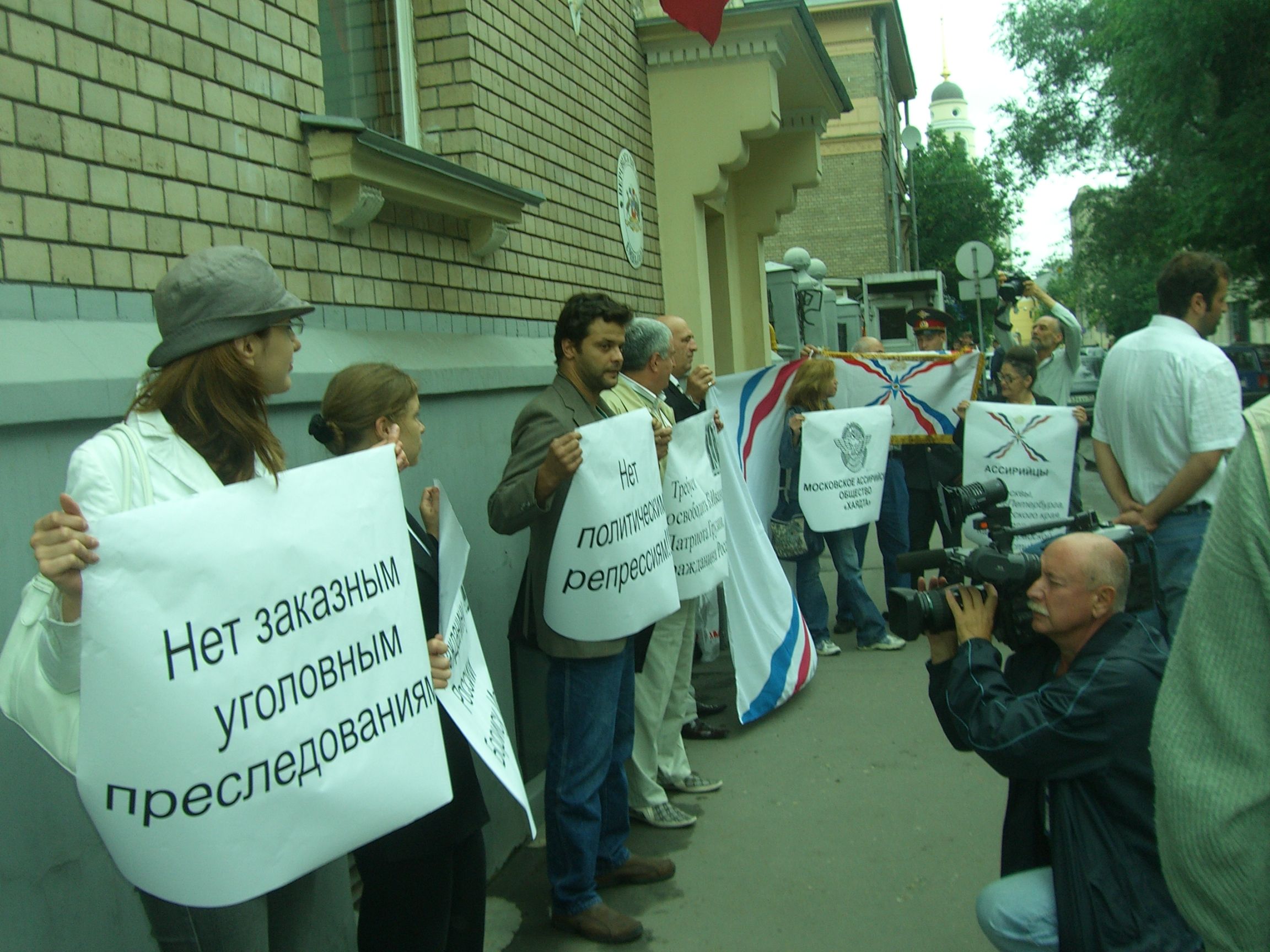 |
Assyrians protest the arrest of Boris Ivanov in front of the Georgian embassy in Moscow on 4 August 2006. |
(ZNDA: Moscow) Last Friday, several Assyrians in Moscow held a protest in front of the Georgian embassy in Moscow, demanding the release of Boris Ivanov, a former high-ranking Assyrian official in the Georgian government. The protestors believe that Mr. Ivanov was wrongfully charged with connection to Emzar Kvitsiani, a former envoy of Eduard Shevardnadze (former president of Georgia) who has openly declared disobedience to the Georgian government. Emzar Kvitsiani is wanted by Georgian Police for heading a rebel group in the Caucasus.
The following is the full text of the petition signed and submitted last week to the President of Georgia, Mr. Mikhail Saakashvili. The national leadership of the Assyrians groups in Russia await a response:
* * * * *
Assyrian Association of Moscow, “Khaydta”
Moscow, Russia
4 August 2006
The Assyrians of Moscow, Saint-Petersburg, Krasnodar Territory, Tatarstan, Kaliningrad Territory and other regions of Russia are outraged at the illegal arrest of Boris Ivanov that took place in Tbilisi, Georgia. Boris Ivanov is a well known Assyrian public figure and a former high rank official of the Ministry of Internal Affairs of Georgia.
On July 27, 2006 the police of Georgia burst into the house of Mr. Ivanov (in Tblisi), conducted an illegal search, without the presence of a lawyer or any witnesses. The law enforcement of Georgia accused Mr. Ivanov of possessing drugs. His trial was held two days later, where he was pronounced guilty as charged and taken into custody. Considering Mr. Ivanov’s spotless reputation and good name, there is little doubt that these allegations have absolutely no foundation.
Assyrians of Russia are very certain that these unlawful actions by the law enforcement of Georgia against Mr. Ivanov undermine the authority and reputation of the young Georgian state which has impeded democratic transformations.
Boris Ivanov has been the head of the International Assyrian National Congress of Georgia for many years and has a respected business reputation in the Diaspora. He has been and continues to be the undoubted leader of the Assyrians of Russia. He is currently a citizen of Russia, and has been living in Moscow for several years. He is no longer engaged in the political activities in the state of Georgia.
The Assyrian community is convinced that the criminal case against Mr. Ivanov was concocted and we appeal to the Georgian authorities to stop these unlawful actions. We understand that the actions against Mr. Ivanov were issued by the Ministry of Internal Affairs of Georgia, which is known to use unscrupulous and dishonest methods against political enemies. We would like to draw your attention to the fact that Mr. Ivanov is very ill at the moment and is in very critical condition. Because of this we consider it impossible and inhumane to keep him in jail and we demand his immediate release.
We are asking the President of Georgia, Mikhail Saakashvili, to personally intervene in this situation, resolve this conflict and protect our fellow Assyrian and Russian citizen from the despotism of the Georgian law enforcement. We are also starting a campaign for the protection and release of Boris Ivanov, and to punish those who are guilty of his illegal imprisonment.
Considering that Assyrians have lived on the territory of Georgia for centuries and also the mutual respect and the interweaving fate of our people, we anticipate the full understanding of the official authorities of the Republic of Georgia. The Assyrians of Russia support the effective struggle by the president of Georgia against corruption, gang-relation crime, and narcotic activity, but we would like to warn the authorities against such abuse by Georgian authorities. We will not allow Boris Ivanov to become a political prisoner and will seek his immediate release.
 To sign an online petition for the release of Boris Ivanov click here. Courtesy of Atra News. To sign an online petition for the release of Boris Ivanov click here. Courtesy of Atra News.
AUA Statement on the Occasion of the Martyrs Day
Assyrian Universal Alliance
Americas Chapter
7 August 2006
In its 1970 Congress, the Assyrian Universal Alliance declared the politically motivated massacre of Assyrians in Semele, Iraq culminating on August 7, 1933 as the Assyrian nation’s Martyrs Day. In observance of this national Memorial Day, we celebrate the heroic life of all Assyrian martyrs who have sacrificed their lives for the cause of the Assyrian nation.
 |
The martyrs’ sacrifice obliges every Assyrian to first trace the martyrs’ footsteps. It is most unfortunate that recent Assyrian history is a dire composition of hardships and sufferings, struggles and betrayals, discriminations and human rights violations, routine uprooting and forced migrations, massacres and genocide. In the nineteenth and twentieth centuries, the extent of the Assyrian nation’s degradation is evidenced by the loss of two-thirds of our population. Ashamedly, the infliction of this outrage has been taking place under the watchful eyes of a world calling itself civilized and encouraging the enforcement of human rights. It is of utmost importance that our Assyrian nation’s tragic experiences and its zeal and endurance in the face of such colossal atrocities do not go unnoticed.
Even more urgently, we must endeavor to take additional steps toward advancing and fulfilling the Assyrian National Cause, the Assyrian Universal Alliance’s core belief that the only way to secure the future of the Assyrian nation is through procuring Assyrian "Territorial Rights" in our ancestral homeland, today’s Iraq. To achieve this nationalistic goal, the Assyrian Universal Alliance reiterates its call to Assyrians worldwide to unite for this greater cause and contribute at all levels selflessly, enduring sacrifices fully and unconditionally as one people.
It is incumbent on the present generation of Assyrians to carry forward the aspirations of our forefathers who sacrificed themselves magnanimously at the altar of a noble vision and promise that is Assyria.
ANA Appoints Ibrahim Behnam as Spokesperson
(ZNDA: Chicago) In a statement released 7 August the Assyria National Assembly (Ashur) maintained that several decisions were made during their recent expanded meeting and the duties of the ANA spokesperson were entrusted to Mr. Ibrahim Behnam.
For more information click here.
Assyrian Reaches Top-10 on New Zealand Idol
(ZNDA: Auckland) Last night, on Sunday, August 6, the viewers of the popular New Zealand Idol (similar to the American Idol show) had another chance to eliminate yet another contestant from the Top-18 list. Among the finalists was the 25-year-old Assyrian, Lenken Isaac, from Willington, New Zealand.
Lenken Issac is the first Assyrian to reach the highest level of competition in any of the IDOL shows in the U.S., Canada, Australia, and New Zealand.
At press time Lenken holds the "wild card" status at press time.
To acquaint Zinda readers with the outstanding live musical performances of this talented Assyrian, Zinda Magazine presents the following links to Lenken Isaac's previous video clips from the NZ Idol show.
We look forward to watching Lenken's live performance on the evening he is selected as the NZ Idol. To vote for Lenken: click here. Anyone living in New Zealand can vote. Voting starts at 7.30pm Each Sunday from 6 August to 22 October and 21 August at 8.30pm and closes each Monday 8.00pm from 7 August to 16 October, Sunday 29 October 9.15pm and Tuesday 22 August at 12.00am.
Lenken's first audition video: click here.
Lenken's duet with Mellisa: click here.
Lenken's performance with five finalists in his team: click here.
 Special thanks to Phillip Pithyou in New Zealand. Lenken Isaac's photo is the property and copyright of South Pacific Pictures, FremantleMedia, and 19TV. NZ Idol is a trademark of FremantleMedia Operations BV and 19 TV Limited. NZ Idol is produced by South Pacific Pictures and is based on a format owned by FremantleMedia Operations BV and 19 TV Limited. Licensed by FremantleMedia Licensing Worldwide. Special thanks to Phillip Pithyou in New Zealand. Lenken Isaac's photo is the property and copyright of South Pacific Pictures, FremantleMedia, and 19TV. NZ Idol is a trademark of FremantleMedia Operations BV and 19 TV Limited. NZ Idol is produced by South Pacific Pictures and is based on a format owned by FremantleMedia Operations BV and 19 TV Limited. Licensed by FremantleMedia Licensing Worldwide.
Assyrian Student, Friend Design Pocket PC Referee Assistant
Courtesy of the Auckland University Media Release
10 July 2006
(ZNDA: Auckland) A pocket referee designed by two Computer Software Engineering students at The University of Auckland will take the pain out of analysing soccer matches.
Ninos Yacoub and Aiman Alsari from the Faculty of Engineering have designed a Pocket Referee's Assistant capable of recording goals, yellow and red cards, cautions and substitutions on a pocket PC through voice commands.
This information can be sent to a desktop PC, for automatic collation and production of a match report.
The Pocket Referee's Assistant is tailor-made software for use on a hand-held PC device, allowing referees to record statistics during a match. It is a world first, eliminating the need to manually record soccer statistics. It is aimed at both amateur and professional level.
"We're really excited to be working on a project that encompasses our two major passions, soccer and technology," says Ninos.
"Most referees are obliged to generate reports after each match," says Aiman. "This device will save valuable match time and make analysing game events and statistics much easier."
Prior to a match, the referee loads game details onto the hand-held device. Player names, numbers and positions are then immediately available during the game at the touch of a button.
Ninos and Aiman's project is a complex programming exercise, requiring the creation of software for both Pocket PCs and desktop PCs.
The pair's initial research showed nothing like the Pocket PC Referee is currently being used on the soccer field. Other versions were for use on much larger devices, were not as efficient or had fewer functions.
Both students are passionate about the sport and Ninos manages the Manurewa Soccer Club's Assyrian team.
"We were both probably attracted to the project because we could envisage how the pocket ref's assistant could really help any referee in any match," Ninos says.
A prototype of the program is almost complete and will be tried at Manurewa Soccer Club later this year.
More Trouble for Chaldean Club in El Cajon
Courtesy of the San Diego Tribune
31 July 2006
By Mark Arner
(ZNDA: San Diego) A young Iraqi-American was rapping against the war in Iraq and lamenting his life as a liquor store clerk when police suddenly halted the show at the Crystal Ballroom.
The lights came on, and hundreds of teens and twentysomethings squinted and grumbled about the interruption.
Like his fans, the 21-year-old rapper, Thomas Hanna or “TIMZ,” appeared confused but remained friendly, based on a videotaped recording of the event provided by his manager.
Hanna approached Sgt. Steve Kirk, who was among a dozen officers who had come to the club after getting a noise complaint. Hanna asked if he could restart his show. Kirk shook his head no.
Then, one of the organizers grabbed a microphone and addressed the restless crowd:
“OK, we got a little problem. We got the police department in the house. They're gonna have everybody line up against the wall. Everybody's got to pull out your ID and show it to the police. And if you're under 18, you've got to go outside right away.”
Exactly who ended the CD release party April 28 remains unclear. Police said it was the promoter; the promoter pointed to police.
For the Chaldean American Association that owns and manages the club at 414 N. Magnolia, it was just more bad news. There had been escalating noise complaints, fights in the parking lot and, a month earlier, shots were fired.
Renting out the club to nonmembers holding for-pay parties was putting its city permit in jeopardy.
Amir Karmo, president of the Chaldean association, acknowledged the contract that Alvin Shamoun, Hanna's manager, signed for the show appeared to conflict with the city code because it allowed minors, even though alcohol was served.
Officers that night cited a 17-year-old for possession of alcohol; escorted two boys, ages 11 and 12, from the ballroom; and cited the ballroom's manager for allowing minors younger than 18 in a cabaret.
Looking back, Hanna and Shamoun said they can't believe what happened.
“If we had known about the history of problems, we would have picked a different location,” Shamoun said.
He estimates he spent $6,000 to finance the CD release party.
“I've spent my entire life savings trying to make this dream into a reality,” he said. Shamoun, 25, owns a check-cashing store in San Diego.
Hanna, of Rancho San Diego, graduated in May from the University of San Diego with a degree in business administration.
He said he couldn't get an explanation from police about why the show was stopped “because they threatened to arrest me every time I asked.”
Both men said they believe the anti-war, anti-President Bush content contributed to the show's demise. Hanna was wearing a black T-shirt bearing a white image of President Bush that read: “Not My President.” He was rapping the song, “There's a War Going On,” with the lyrics:
ARE YOU COVERED? |
 |
ATO INSURANCE
Click Photo For More Information
Auto | Homeowners | Business | Health | Life |
|
Dear Mr. George Bush
Why do you make a fool of us?
For over two hundred years
We stood for what's good, now we despised by our peers
This ain't gon' last for long
They wish us dead, George, they wish us gone
And what do you do?
But add fuel to the fire and send in more troops
Shamoun wrote a letter to The San Diego Union-Tribune days after the show was aborted, alleging racism.
“Somebody needs to remind the El Cajon Police Department that there are Arab Americans that live in America and that they are not terrorists,” Shamoun said.
“What was supposed to be an album release party for the first Iraqi-American hip-hop artist born in San Diego, quickly turned into something else, what looked to me as a scene straight from Baghdad,” he said.
“My feeling is that they came in to shut down a celebration of support for an up-and-coming Iraqi-American musician and did so in a racist way.”
El Cajon police Capt. Pat Sprecco adamantly denied any allegation of politics or racism. And he insisted police did not order the event shut down. He said promoters made that call to avoid having all the guests provide identification.
“We were there in response to a complaint from the community about a loud party,” he said. “We were not making a decision about the performance. We've had a few loud parties there and a lot of people have responded. The allegation about racism is absurd.”
Police records showed 13 noise complaints about the ballroom last year, with 12 complaints in the first four months of 2006; four reports of battery in the ballroom's parking lot during 2005, with one battery in January; and gunfire on March 26 after a large rap party.
No one was injured, but police found four bullet marks on a Toyota Camry. The motorist, 19, said he was parked in the lot when several bullets glanced off his car. He sped to a nearby store and called 911.
Police found eight bullet casings from three handguns in the parking lot. A janitor later found one of the weapons – a .380-caliber Baikal handgun – in bushes by the ballroom.
When police showed up in the middle of TIMZ's performance a month later, it was with a dozen officers and a dog.
Was that excessive? Hanna and Shamoun thought so.
“I wasn't there, but we'd respond with as many officers as we had available,” Sprecco said. “Because of the type of problems we've had at that particular location, police are concerned about their safety and the safety of those in attendance.”
He said a show of force is not intentionally done to embarrass anyone.
“It's what we think is appropriate,” Sprecco said. “We're always outnumbered. With a crowd that size, if we had 20 people (officers) there, if they decided to take us on, we would lose.”
Laith Yousif Jajou, the ballroom's manager, declined to comment and referred questions to Karmo.
Karmo said he was certain the police response was not racist and that police were only keeping the peace that night and trying to enforce the city code.
“They're the police,” Karmo said. “They've got to protect us.”
Since October 2000, the Chaldean association has managed the ballroom under a conditional-use permit from the city to operate a “public banquet facility,” “restaurant” and “social club.” Its permit expires in 2010.
Karmo said he, Jajou and others from his group met with El Cajon police last month. They discussed concerns from the city's planning director that the ballroom was improperly rented out to people who didn't belong to the group and it was prompting many noise complaints.
In a memo to the police chief in May, Planning Director Jim Griffin wrote: “If the Crystal Ballroom refuses and/or they continue to use the facilities in ways that cause problems, we can proceed to consider revocation (of the permit).”
To stop the noise problems, Karmo has also promised to stop renting the ballroom to groups with DJs that charge entry fees to guests. He said he would restrict the ballroom to hosting family-oriented events such as wedding receptions and Communion parties.
Karmo said his group has always maintained a good relationship with El Cajon police and other law enforcement agencies, and periodically hosts retirement parties and political gatherings for El Cajon officials.
The Chaldean American Association was formed in 1978 and initially rented rooms at the German Club in El Cajon for its gatherings. It moved to 115 S. Mollison for about a decade before buying the building on Magnolia in 1998.
Neighbors in some surrounding homes and businesses said the Crystal Ballroom has had many loud parties and other problems in recent years.
Carmen Guerrera, owner of a beauty products firm nearby, said the ballroom's customers often fill his parking lot, leave litter and block his rear office door with their cars.
“I'd like them to be considerate,” Guerrera said. “Don't block my doorway and keep my lot clean.”
Heraclio Tolley, a homeowner, 28, on Wisconsin Avenue, said he doesn't mind the ballroom's music. But he has been troubled by occasional fights in the parking lot and litter that sometimes blows into his front yard.
“I think the community didn't feel they were respected,” Tolley said.
|
|
Surfs Up!
Your Letters to the Editor
|
Why Ask Israel to Stop?
Yavin Katz
Israel
Zinda's July 29th headline tells us that "Fearing Reprisal from Islamic and Arab governments & masses, Assyrian Church & parliamentary leaders in the Middle East swiftly condemn Israel attacks on Lebanon".
Thank God, in Israel, the only democracy in the Middle East, fear does not rule, and Arab members of the Keneset (the Israeli Parliament) stand up and call the Prime Minister a murderer in front of the international media, and go on living without the fear of reprisal, and the state protects them.
As to the facts, Iran's agent in Lebanon, Nasaralla, crossed an international border into Israel, killed, wounded and kidnapped Israeli soldiers, as a diversion, at the same time he bombed civilian towns all over northern Israel,
with "katyush" bombs.
The state of Israel decided to try and put an end to this kind of terror. Those who cooperate with Nasaralla and some times their neighbors,
suffer. It is sad but so are all war actions.
Augin Kurt asks, will Israel create a Kurdish state? He goes on and states that"The existence of Israel and its future allies is more important than the existence of the indigenous populations of the Middle East such as the Assyrians.The U.S.A. economic interests are secondary in this respect. The reason first and foremost, is the strong position of the Jewish groups in the U.S.A."
This statement takes us back 90 years to the "Protocols of the Elders of Zion" a fake anti Semitic publication that came to prove how the international Jewry rules the world. The real sad proof came out a few years later, during World War II when a third of the Jewish nation was murdered by the Nazis and no one the world over, lifted a finger to help. The U.S. refused even an act of mercy; it did not bomb the death camps. The strong Jewish groups did not help either.
Israel can train pilots -I don't know if it does - the same as it can train dairy management or atom splitting. We have the knowledge. Israel can not create states we are not that big. Israel still struggle to secure its own borders.
Assyrian Brethren, I am not angry; I hurt with you.
ZOWAA’s 4th Conference Attendees Address Chicago Public
Helen Talia
Chicago
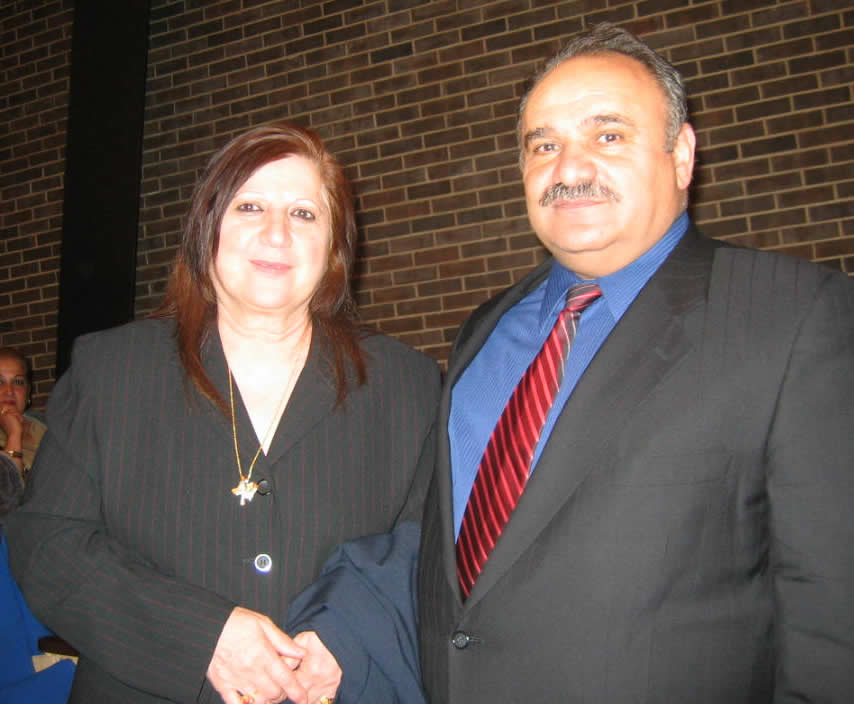 |
Mrs. Dadeh and Dr. Adam Benjamin standing before the Chaldo-Assyrian Community Center in Skokie, IL. |
A 500-member conference, also known as loumada, took place at the Assyrian Democratic Movement headquarters from June 29th thru July 2nd, 2006 in Baghdad, Iraq.
Attending representatives from the United States were Dr. Adam Benjamin, Dr. Agnes Merza, Mr. Aprim Rasho, and honorary guest, Mr. Sheba Mando, President of the Assyrian National Council of Illinois. Reporting back from ZOWAA’s 4th conference from homeland Iraq, the team met the public on Sunday, July 30, 2006 at the Chaldo-Assyrian Community Center in Skokie, Illinois in a dinner banquet, followed by a press conference, which included detailed accounts of each individual’s experience.
The first speaker, Dr. Merza, stressed the importance of the female role in community activism, encouraging females from all backgrounds to join the fight. In her statement, she signaled that only 25% of the Iraqi Parliament is made up of females, saying, “I did not go to the conference as a member only, but as an obligation.”
“Our community is very needy,” pleaded Aprim Rasho, giving accounts of and scripts from the lives of our struggling brethren back home. One story in particular stood out, leaving the crowd in dismay. It was about a 19 year-old youth who secured his life through safeguarding the lives of the 500 individuals attending the conference. The point of the story was that at a tender age, there is someone who is placing his life on the line to protect others.
The following guest speaker, Mr. Mando, reflected on his position as the president of the Assyrian National Council of Illinois (ANCI) saying, “As Moutwa, we are ready to join the organizations in working together as a team, by extension becoming more effective.
We want to bridge the gap between the organizations and the general public to help support our people back home. Let’s all as organizations, sit on one table, discuss, argue and meet toward one common goal, which is to support our nation, leaving no one behind to turn outside of our community for assistance.” Worthy of mentioning, the Assyrian National Council of Illinois recently donated $100,000 for education programs in Iraq.
Why Baghdad? The first loumada took place in the City of Baghdad in 1979, said Dr. Benjamin, addressing the guests on why the 4 th conference took place in Baghdad. Attendees at the loumada came from every village, city, state, country and continent worldwide where Assyrians presently reside. This is proof that the Assyrian Democratic Movement will go on. Additionally, Dr. Benjamin spoke of the 14,000 Assyrian refugees that have fled Baghdad, Basra, Kirkuk, and Mosul and settled in Dashta D’Nineveh, including hundreds of doctors and other professionals who have relocated their clinics to the north due to lack of security in major Iraqi cities. “Funds are needed everywhere, he concluded, and there is a deficit in providing necessities for these families.” With these words, heaviness fell upon the crowd. “There is no water and no electric supply." Doing the math, the responsibility will have to be shouldered on each individual.
Questioning Zinda Polls
Shushan d'be Qasho
Germany
I thought I will let you know that the Zinda polls are often superficial.
They will not be useful in the way they are formulated and they pull down the level of Zinda. Especially the poll of such a sensitive issue as that of 8th July is misleading. The topic is too important to just be presented like that. The presumption is as if it is up to us to improve the relationship with Turkey (who are we to even move a chicken?)
It is Turkey leading the question here. To 'improve' the relationship with Turkey would mean in this case to give up any requests we have today from Turkey. Until now Turkey has not changed anything in its formal approach towards our people.
Nevertheless, Turkey is playing smart by smiling to our 'leaders' and giving them a hug with a glass of Iraq. Let us start looking at things in their complexity.
What Happened to Humanity?
Dianne Shimmon Comini
California
Two-thirds of the Assyrians who answered your poll think that blowing people up will be good for us? Anywhere?
And the main reason we oppose the Israeli agression is because of reprisals? What happened to humanity?
You realize that over 80% of Lebonese Christians support Nusrhula. I like him too. I don't have to agree or have the same beliefs as someone to appreciate their courage and willingness to fight for those who cannot defend themselves! Peace.
The Whole Story of the Evacuation
Gaby Kiwarkis
Australia
I am writing in response to the article by Shamasha Gewargis Beth Benyamin titled “the Great Assyrian Exodus of 1918", in 29th July issue. A well written story, but unfortunately has many inaccuracies, the following corrections are from incidents that are well documented.
- The pilot Capt Pennington was ordered by General Dunsterville to fly to Urmia and deliver his message, he flew from Baghdad to Miana [ furthest outpost held by British] where the plane was overhauled and then flew to Urmia. His uniform was standard issue; it was supplied to all Dunsterforse volunteers. It was a daring flight, he had no idea it would succeed or that he would be able to land let alone make it back, that type of soldier was deliberately chosen to make up the ranks of Dunsterforce, most of its members had already shown great courage in France and Gallipoli.
- In the message it was made clear that the British were a small force and they would not risk going further north of Sain kahleh and that they would be carrying 100,000 rounds of ammunition, twelve Lewis Guns and money [45,000lb] to supply the Assyrians and Armenians. This they feared would fall into enemy hands. Agha Putros agreed to ride south and defeat two Turkish divisions and meet the British at Sain Khaleh at an agreed date, the 22 July 1918.
The Battle:
After carefully mapping out his route and drafting his plans, Agha Putros decided that he would move south in three columns, each separated by some miles of rough country. It was then decided to attack during the night, and force the enemy to fall back on his base, and into the hands of the mounted force. The whole plan worked without a hitch. The column moving without mishap, got into touch with the Turks and formed a line, and in the dead of night, the whole line moved forward to the accompaniment of intense rifle fire and shouts of victory. The Turks were bewildered at this unexpected attack at such an unexpected time. Their stand was feeble and they were forced to retire in a disordered state to Suldaz, to find waiting for them a mounted force in such positions that the Turks were completely annihilated.
a - On the 23rd, a day late the British arrived at the rendezvous.
b - On the 25th, not hearing from the General they withdrew fifty miles south.
c - On the 2nd of August the Assyrian forces arrive at the rendezvous, 11 days late.
3. The Assyrians in Urmia were fighting gallantly and would have held the lines if not for this incident told by an Assyrian Doctor to Captain Savige AIF during the exodus. “That night an Assyrian doctor rode in and told us the whole story of the evacuation.
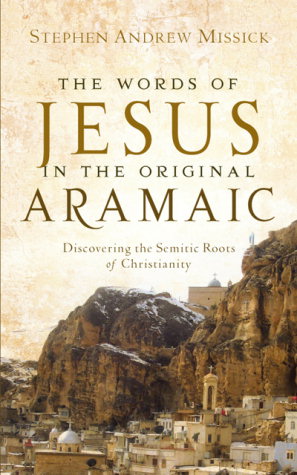 |
Click Image to Order Your Copy |
It appeared that there were fifty or so Russians who had remained behind after the Russian evacuation. These were chiefly officers and men who knew that if they returned to Russia with its new government, they would have a very short shrift. The Armenians had been driven back to Lake Urmiah from Lake Van and thousands of Christians had flocked into the town from the surrounding sent forward mounted messengers with orders to ride back when it was ascertained that Agha Petros and his forces, who were chiefly Assyrians, had broken through the Turkish army and opened up the road that led to the British. This news was sent back to the conspirators, who immediately took steps to evacuate the town.
Dr. Shed, the American Missionary, had been left behind to conduct affairs in the absence of Agha Petros. He noticed that the Armenians were evacuating their line north of the city. When questioned as to the reason of their strange behaviour, they stated they were simply moving from their camp to a more healthy position. This did not seem at all feasible to Dr. Shed, who told them that he thought they were lying and that their intentions were to desert the Assyrians. They assured him that this was not the case, and after his asking them if they contemplated such an act, to remain for at least four days, he rode back to the city, on their giving him their promises. They apparently waited till nightfall and then continued their march southwards, with both the Russians and mountaineers. The Turks very soon received intelligence of the fact that the northern portion of the line, held by the Armenians, was unoccupied, and, together with the Kurds, moved down on the city”.
As Assyrians we need to learn to take time out to thank those that helped us. Although some have treated our people badly there were some who risked their own lives to save us. During the exodus of 1918 the British supply column, made up of mostly ANZACs remained at the rear of the refugee column holding on to defensive positions until surrounded, and only at the last minute extracting themselves to take up yet another defensive position, this was repeated time and time again for six weeks to give the refugees the best chance possible to escape. These men should be remembered as we remember our own.
God bless them!
Naqoosha Radio Now Live Online!
Peter Esho
Naqoosha Public Relations
www.naqoosha.com
Australia
The Assyrian-Chaldean-Syriac community in Sydney has recently been the subject of negative publicity. Failed investment schemes, shootings, crime and the likes have regularly been published online. Out of all this misery emerges a story of hope, determination and courage. Naqoosha D’Hemanoota has evolved from an idea to reality through hard work and faith in Christ.
Back in February this year a group of church members came together and raised the idea of starting a radio program. The aim was to develop an alternative Christian voice, free from any church rhetoric and focused on what a Christian program should do – preaching the Gospel. With the help of the Committee in Solidarity with Mar Bawai Soro that idea became reality.
 |
The Naqoosha Studio in Sydney |
The Naqoosha program is produced by Romeo Hanna who brings with him a long history of broadcasting. Romeo has one of the largest Assyrian-Chaldean-Syriac music collections around the world. Every good program needs a pair of exciting and vibrant hosts so Naqoosha approached non other than Ninos Kako and Carmelan Zudo. Ninos is a well known Assyrian producer with many years in the realm of Arts. Carmelan is recognised as a Diva around the world for her singing with an impressive dedication to songs of praise. Ashur Lazar is Naqoosha’s co-host and regularly reads poems, proverbs and prayers to inspire our listeners during difficult times.
After airing for two weeks Naqoosha was approached by well known Sydney DJ Ninus Kanna. Ninus has worked with many record labels and even produced his own music which has been played across the country. He decided to use his skill for Christ and join the Naqoosha team as sound engineer, making sure everything sounds professional and smooth.
So what can you expect to hear on Naqoosha? Every Sunday from 6-7pm the program is filled with songs of worship, prayers and Christian news from around the world. The highlight of the program is usually a sermon by His Grace Dr Mar Bawai Soro. Issues such as the Holy Mass, forgiveness, repentance and importance of studying the gospel are discussed. Many listeners have rung into the program and sent the Naqoosha team feedback saying they have learnt so much about things they previously took for granted.
The benefits reaped by the Sydney community can now also be enjoyed by everybody around the world. Naqoosha now broadcasts live online through a stream from the 2GLF FM studios in Sydney. You can listen live, view archives and read the latest listeners feedback by logging onto Naqoosha’s interactive website www.naqoosha.com. Future plans include adding a podcast service so listeners can download the latest programs onto their ipods. Video records of interviews will also begin appearing on the website via the Youtube.Com service.
Naqoosha is independent and welcomes announcements from all churches and organizations. Don’t forget to listen on 89.3fm or via the www.naqoosha.com every Sunday.
U R M I E CD |
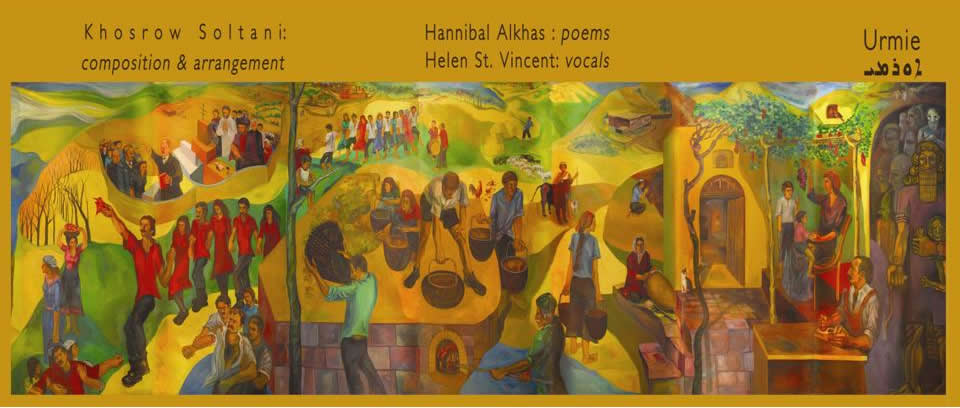 |
T h e H a l l u c i n a t i o n s o f a n A r t i s t |
Once A Bishop, Always A Bishop
Sargon Levi Gabriel
Canada
Assyrians of the world must unite against the ones that are spreading discord and disunity among our Assyrian Nation.
I was reading the most beautiful and wonderful article in Zinda magazine, the presentation of our Assyrian tragedies in the Middle East and especially Iraq by Rosie Malik-Younan, I cried with joy because a beautiful Assyrian lady had presented our calamity to the American people, and sadness because of atrocities that have been committed against our Noble Assyrian Nation. I also read the articles about the mistreatment of our people the Assyrians in North Iraq by Massoud Barzani and his clan, and how KDP terrorists are operating freely in Assyria with the help of Kurdish police, and are terrorizing our people the Assyrians, I also read the article “Kurdistan” crime of culture.
Then I came across an article written by no other than Adam Haddad. An article that is mean and nasty. An article that provokes disunity, distrust, hatred, dissent and discord in our beloved Assyrian Nation. He should concentrate and write about the tragedies that are befalling our Assyrian Nation in North Iraq, and the persons who are selling our Assyria for a fistful of dollars.
Allow me to make it clear to Mr. Haddad and all others who call His Grace Dr. Mar Bawai by his last name, Soro. It is shame that you write without knowing what is written in the “Manual of Canon Law” or Sunhados of the Holy Apostolic Catholic Assyrian Church of the East. You must know that once a person has been consecrated he is inducted into a permanent rank with a religious rite. His Grace Dr. Mar Bawai was ordained to the office of Bishop - period - and no one, I mean no one, can take that ordination away from His Grace.
You better consult with His Grace Mar Emmanuel, the Bishop of Canada, and His Grace will explain to you what an ordination means in the Assyrian Church.
In the last meeting of Metropolitans, bishops, and priests of the Holy Apostolic Catholic Assyrian Church of the East in Chicago with His Holiness Mar Dinkha IV, I was told by the ones who attended that meeting that His Holiness Mar Dinkha IV was always referring to Mar Bawai as Mar Bawai. Who are you then to call His Grace Dr. Mar Bawai a defrocked Bishop?
We must contribute our writing to promote the Assyrian National feeling and try to be more modest. Being so nasty will lead us nowhere. Persons who hold their own knowledge in so high esteem and are quick to impose it arrogantly on others may not be as Nationalists as they wish they were.
Do not try to find faults in others, just try to improve your image by being a good Assyrian working for the benefit of our Assyrian Nation, and Assyrian Church. Show us the accomplishments you have done to the Assyrian Church in Canada and our beloved Assyrian Nation. God Bless Canada and Assyria.
|
|
Surfer's Corner
Community Events
|
A Film on the Assyrian Genocide: Sayfo, the Elimination
Council for Assyrian Research and Development
Toronto, Canada
www.cardonline.org
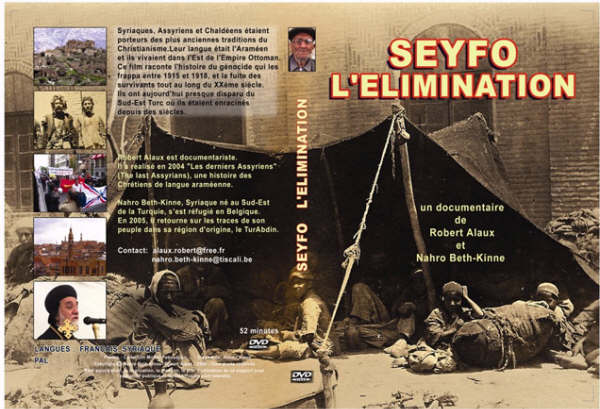 |
“Seyfo L’Elimination” (Sayfo, the Elimination), the 52 minute documentary film in Francais and ‘Syriaque’ was released earlier this year by co-producers Robert Alaux, (The Last Assyrians, DVD, 2005) and Nahro Beth-Kinne. The footage includes the Hakkari Mountains and Tur Abdin in Turkey, and the Urmia region in Northwest Iran. The film follows neatly the recent work of various academic researchers on the ethno-cultural genocide against the Assyrian people in the Ottoman Empire from 1915-1918. Based highly on various interviews conducted by Beth-Kinne, Sabri Atman (Assyrian Genocide scholar) and others, the work seeks to bolster Assyrian claims of genocide through survivor eyewitness accounts of the period in question. Though the authors have attempted to remain “neutral” by using the term “Assyrian, Chaldean, Syriac people” they teeter dangerously close to politicizing the Assyrian ethnic and cultural identity in their attempt to remain inclusive. None-the-less, the documentary is an invaluable asset for researchers on genocide and ethnocide thanks to its meticulous interviews.
For ordering information, please contact:
Mr. Beth-Kinne: Nahro.beth-kinne@tiscali.be
Mr. Alaux: alaux.robert@free.fr
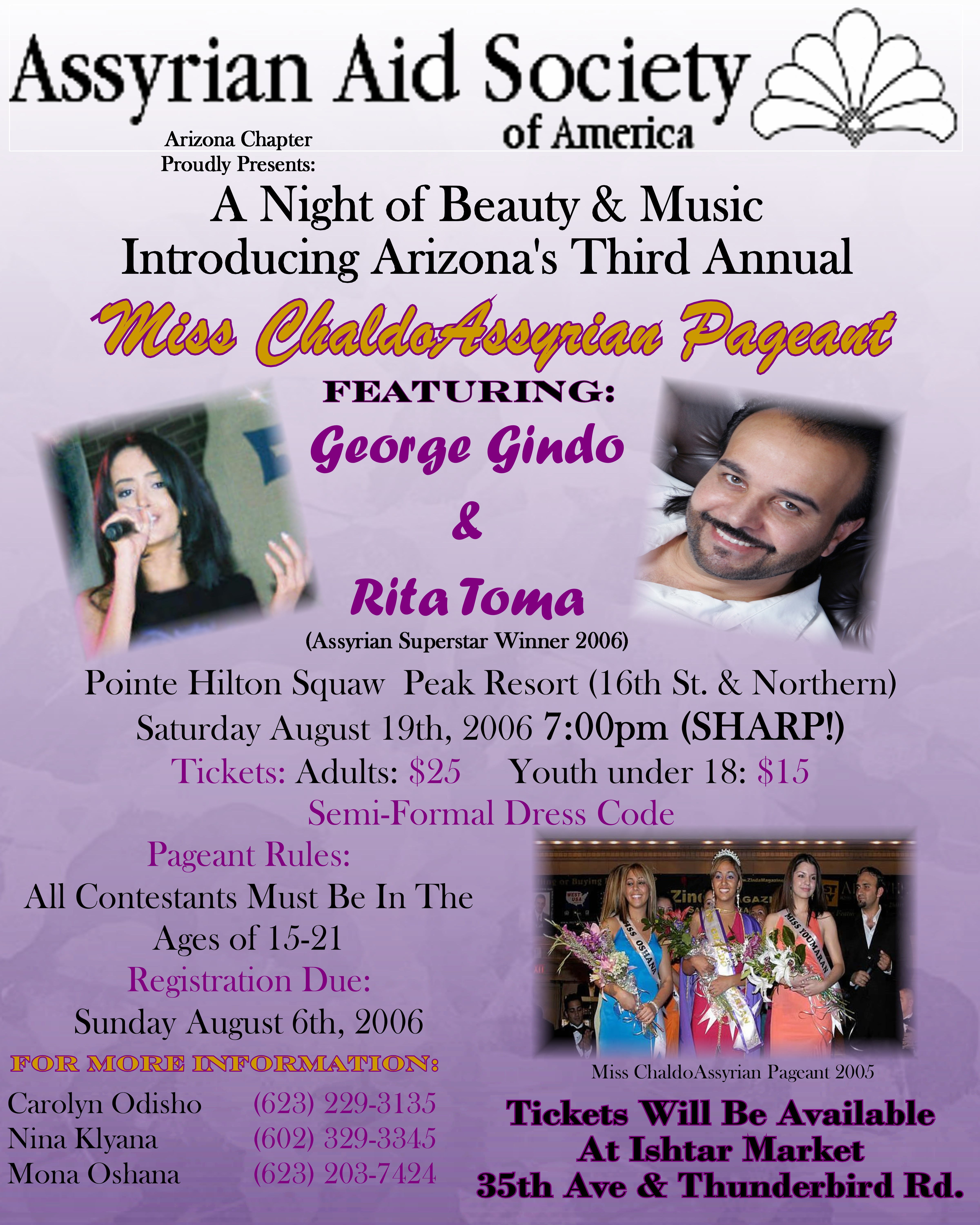
In the Beginning: Bibles Before the Year 1000
Arthur M. Sackler Gallery, Washington, DC
October 21, 2006–January 7, 2007
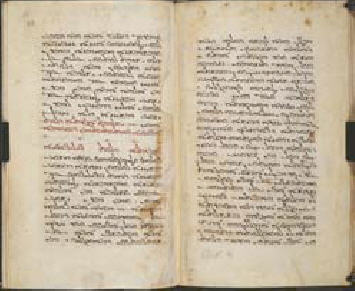 |
| Epistles of St. Paul in Syriac.
Bound manuscript; vellum
23.5 x 17 cm.
The British Library. Click image to view larger version. |
Amanda M. Williams
Smithsonian Institution
Washington, DC
This extraordinary exhibition will assemble for the first time many of the most important codices in the world, exploring the historical circumstances and visual cultures that produced them. The works on display will range from fragments of the earliest papyrus codices to lavishly inscribed manuscripts on purple parchment, beautifully illustrated, and enclosed in elaborately decorated covers. This exhibition will examine the emergence of a canonical set of texts, their translation into diverse languages and dissemination over a vast geographical expanse, and the uses and iconic status of the Bible as book, from the second to tenth centuries.
Click here for more information.
Naqoosha Radio Now On Air !
Meet the Naqoosha Radio Team
The program airs in Sydney on 89.3FM on Sundays between 6-7 PM. The main focus and aim is to broadcast Christian related material to our community based in Sydney in the Assyrian (modern Syriac) language.
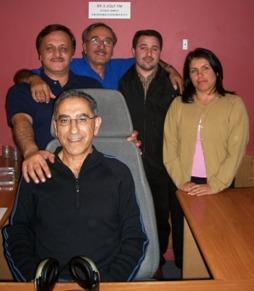 |
Meet the Naqoosha Radio Team |
For many years the Assyrian-Chaldean-Syriac community in Sydney has lacked an alternative independent Christian voice. Our aim is to entertain but also evangelise the message of Jesus Christ.
Key features include bible readings and songs of worship. The highlight of the program is usually a sermon or lecture by His Grace Bishop Mar Bawai Soro on various topics. His Grace explores biblical issues and concepts to boost the spiritual growth of our listeners.
The team is led by producer Romeo Hanna who brings with him a long history in broadcasting. Romeo has one of the largest collections of Christian songs, hymns and sermons. Well known Assyrian identity and film producer Ninos Kako with singer-song writer Carmelan Zudo host the program jointly.
Ashur Lazar co-hossts and adds flavor with poems, prayers and the latest in Christian news around the world. Ninus Kanna, a well known DJ in Sydney, makes sure the program runs smoothly and sounds professional. A complete team dedicated to spreading the Word.
Naqoosha Broadcasting Live On the Internet!
You can listen to Naqoosha anywhere around the world via the 2GLF FM website at the following global times.
Every Sunday: Sydney-Melbourne 6pm, Moscow-Baghdad 12pm, Sweden 10am, London 9am, Chicago 3am and California 1am
We also aim to bring you each weekly program in a stream and podcast (mp3) format to download and listen on your portable media device, car, work or home.
Just log onto the website weekly and download the latest show. Naqoosha also has plans to upload interviews on the increasingly popular YouTube.Com website.
Karaoke Party in London
DAVID YOUKHANA
|
|
ARIZONA
Real Estate-Relocation-Investment |
|
Broker / Owner
Certified Commercial Sales Specialist
Babylon Realty
Glendale, Arizona 85310
Click Photo For More Information |
602-410-9555
|
|
Following a very successful and enjoyable Social Night back in March and a fun Message Board Gathering in May, we’ve decided to throw another Social Night/Gathering!
On Sunday 13th August 2006, the New Generation Assyrians will be holding a Karaoke Dinner and Party that promises to be great fun.
It will be a great opportunity to show off your singing talent, enjoy the company of your fellow Assyrians and indulge in some tasty Mexican cuisine.
Date: Sunday 13th August 2006
Cost: £20.00 and includes: a starter, main course and dessert (drinks not included)
Deposit:
To reserve your place, we will require a £5.00 deposit per person. This can be paid to any NGA member up to and including Sunday 6th August 2006. NGA members will be free to accept deposits during PITP.
Place:
Chico Mexico Restaurant, 41 Bond Street, Ealing Broadway W5, London
Time:
18:00 till Late
Age:
Over 16's Only
We look forward to seeing you all there for what will no doubt be an entertaining and enjoyable night.
|
|
The Minority Syndrome!
Ken Joseph Jr.
Japan
It is a phenomenon that happens often to minority communities within majority areas. It is known as the “Minority Syndrome” and can be seen particularly these days in two areas of conflict in the Middle East – in Lebanon and Iraq.
 |
To Download & View "Khoba Khaya" Trailer Click Here (10 MB) |
The Minority Syndrome is when a minority, such as Assyrian Christians in Iraq or Maronite Christians in Lebanon, and many of their compatriots overseas for example, instead of identifying with their historical and moral friends, instead identify with their enemies due to the intense pressure and influence of living in minority status.
In much the way hostages often end up identifying with their captors or abuse victims defending their abusers, those with the “Minority Syndrome”, due to a number of factors identify with those who are in fact hurting them.
I will never forget trying to get a visa at an Embassy. I had often received a visa at the Embassy, and was very close to the moslem employees.
I was delighted when a fellow Assyrian Christian began to work for the Embassy, a friend and immediately went to visit him.
I said, “It is wonderful you are now at the Embassy! God has sent you here! I will introduce you to the Christians in the government and we can help our people.”
You can imagine my surprise when he said “I am not here as an Assyrian Christian – I am here as an Embassy Official. My job is to work for the country.”
Knowing that all the other minorities worked full time at the embassy and then for their respective groups and or tribes in every free moment it seemed very strange.
My shock didn’t end there! Days later I still had not received my visa! Instead of being easier with a fellow Assyrian Christian on staff, he had made it harder!
Things became very complicated when I was talking with another Embassy employee, a moslem who said “We don’t understand him! He is an Assyrian Christian, but he is more “moslem” than we are!”
I had encountered the “Minority Syndrome” firsthand!
There are a number of factors affecting the syndrome. First, is the desire of minorities to want to be accepted by the majority and to be seen as “patriotic”. As minorities, they feel they need to be “more patriotic” than the majority to overcome the view that they are not.
Second, in particular for those born and raised in the system, there is a version of self-denial that denigrates oneself, and adopts the worldview of the majority uncritically even though this worldview may be hostile to the minority.
Finally there is classic “self hate” that develops as a result of the generational minority status.
I will never forget days after the fall of Baghdad. A group of us had gathered and were going to join the daily demonstrations taking place at that time in front of the Palestine Hotel – the seat of government at that time.
The young Assyrian Christians were eager to show their flag and signs along with the Shiites, Kurds, Sunnis, Communists and others that were gathering every day in the central square of Baghdad.
The first sign, done also in English so it could be seen around the world read “A Homeland for the Assyrian Christians” – precisely the same message as all the other groups had.
As we prepared to leave the leadership said, “No, you cant to a message like that! It will be too provocative!”
“But everybody has their message. Why cant we.” The young people asked. “We are Iraqis first,” said the leaders.
We all went back and redid the signs. The next sign said, “Protect the rights of the Assyrian Christians”.
Once again, getting ready to leave we were told, “You cant say that!” “Why now” we responded. “You need to say, “Protect the rights of all Iraqis”
Seeing firsthand the spinelessness of the leadership the young people said “forget it – we are not going all the way to the center of Baghdad, make posters and stand out in the hot sun with signs that say “protect the rights of all Iraqis”.
This is a classic expression of the “Minority Syndrome”.
The response when challenged with this spineless attitude, minorities respond by saying “our lives will be in danger or our families”.
While in theory this may be true, the reality is that, particularly in moslem countries the only thing respected is power and confidence.
The minorities, in particular the Christian minorities, do themselves and their cause a great disfavor by being more “moslem” than the moslems themselves and finding themselves chanting on the wrong side of the argument.
In the end, the other side does not respect those who do not stand up for themselves, even though they may disagree. This expression of classic “self hate” is at the core of the reason that minorities in the Middle East in particular have attained so little.
It is time to do away with the “Minority Syndrome” and with confidence, knowing that the waves of history and international norms are on our side stand up confidently first for who we are and second for what we believe.
It is then and only then when the goals will be attained. The Moslems, as they express privately will respect this expression of confidence.
 Ken Joseph is an Assyrian Christian, a writer and columnist and directs www.assyrianchristians.com. Ken Joseph is an Assyrian Christian, a writer and columnist and directs www.assyrianchristians.com.
The Great Assyrian Exodus of 1918
Eddie Shamasha Gewargis Beth Benyamin
Chicago
- Continued from last issue
After the Assyrians met the British in Hamada, they stayed several days there, and then continued their journey to what we can describe now as a journey of repatriation to their ancestral homeland, Beth Nahrain. This time they headed westward towards Baquba, some 200 miles away. British provided trucks for those who were unable to walk, others were on their horsebacks, and the rest were on foot.
Prior to their departure, British had already set up a huge camp in Baquba; it was called “The City of White Tents”. Over 3,000 tents were pitched and ready to be occupied. They were situated on both sides of the railroad tracks. It is obvious that it takes several months to have such large number of tents and other logistical supports brought to Baquba from any destination, especially during the war. This was another indication that the British had planned the Assyrian resettlement months before. Those who crossed the stretch on horseback reached earlier. General Agha Patrus and other fighters who were receiving some military training reached later. Patriarch and family reached in 13 days, those on foot reached a month later. Among them was my father, who was fourteen when he fled Hakkari on foot, but he lost his shoes in Hamadan and managed to walk to Baquba bare foot.
When they reached Baquba, they slowly began settling in those tents. The British, who were administering the camp, tried to gather the family members together in tents, but there was no family in full members; at least one or more was lost in the way between Urmia and Hamadan. Tents were large and had a capacity of 25 people, and some more. All were full. British took good care of them in all means; they provided them with food, clothing, and medical care. They were approximately 90,000 Assyrian refugees; among them were Armenians. Arabs who were living around the camp protested against the British for bringing foreign refugees in their land, but British ignored them simply because they were their smallest allies, and a precious commodity in their possession, and they had to fulfill their promise to them.
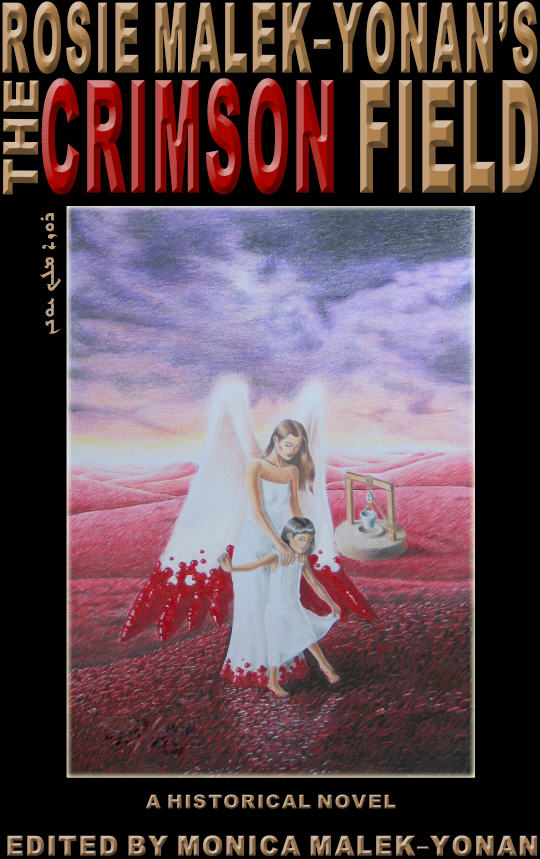
Click Book Cover For More Info |
Three months later, Patriarch Mar Paulus became ill. He was taken out of the camp to Northern Iraq to have better medical treatment. General Agha Patrus declared himself a leader of the camp. British rejected his action and assured him that for hundreds of years, Patriarch of the Church of the East was the sole spiritual and national leader of the Assyrians, especially those who were living in Hakkari. This British action infuriated many people who supported him, especially the people of his tribe. As a result of that, they divided into two groups, one group supporting General Agha Patrus, and the other group supporting the British decision siding the Patriarch. This kind of division created an atmosphere of hatred and animosity between them. It reached to the point that if a member of one group dies, members of the other group would beat the drums of joy. British realized that this situation would create a problem for them in the future, and it would be difficult to control such outraged Assyrians. They made a decision to take General Agha Patrus, his brother Mirza and their families out of the camp. They sent them to Baghdad, some 40 miles to the west. They isolated them from the rest for one year and nine months, and banned them from making any contact with their fellow Assyrians in the camp for the duration of their stay in Baghdad.
After the situation was somehow calm, the British, who had full authority over the camp, elected Lady Surma, sister of the Patriarch as an overall leader. They later established some kind of classes teaching Assyrian and English language. They wanted to educate them, and not let them be illiterate.
Lady Surma, who assumed the leadership of the camp, tried her best to find a solution for their situation. On July 1919, she made a trip to England and addressed the Assyrian refugee issue to the British legislators. Her efforts did not go very well. She then invited Mar Emmanuel, Patriarch of the Chaldian Church, (1900 -1948), who was residing in Baghdad at that time, to come and visit them. He came and stayed two days in a special tent made just for him, many people visited him, and among them was Lady Surma. She had an important issue to discuss with him. She humbly asked him “ Father, we are suggesting now, and wanting to have a unity between us, and your people”. Mar Emmanuel interrupted her before finishing her sentence saying “Please my daughter, please, the doors of our church are open for all of you, any time you wish”. Lady Surma continued with her subject saying, “We want to unite together as one nation, and will ask the British to give us a part of this country, then, we can secure our human and national rights in it”. Mar Emmanuel replied in his own native accent saying “Ady lac barya, which means (No, this cannot be). He continued saying “We have to live in peace with our Muslim neighbors, because they are stronger and much populous than us”.
After saying these discouraging words, Patriarch Mar Emmanuel left the camp and headed back to Baghdad. People of the camp were disappointed and frustrated somehow of his reply, including the British, in which he had less respect to them than to Turkish rulers. After a short period of time, British came to his residence in Baghdad, and took him away and exiled him to Bombay, India.
It is fact that the Patriarch Mar Emmanuel, as a spiritual leader of the Chaldian faithful who were living in Nineveh plains, had full authority over them, they maintained the ownership for their villages and lands for centuries, perhaps since prophet Nahum’s time, who was born in Town of Alqush, who prophesized the fall of Assyria. That area was enough to settle up to two million people while it was empty of Kurdish people. No doubt, Patriarch Mar Emmanuel disliked having Assyrians to live in that territory.
Few months later, Patriarch Mar Paulus passed away. His nephew was consecrated as a new Patriarch; he was named Mar Eshai Shimon XXIII. He was 12 years of age and was very young to lead his people. His aunt Lady Surma kept her position as a leader till he reached the maturity age.
Two years had passed since they arrived in Baquba. British decided it is time to close the camp, and to move all the Assyrians out to Mundan as planned. Though it is sad to say that 18,000 Assyrians lost their lives at the camp due to their illness along that dreadful stretch between Sa’een Qala and Hamadan, they were given proper burial and laid to rest in one mass grave. A monument was erected in their memory. Unfortunately, many Assyrians till this day blame the British for causing their death by adding gypsum into their flour when baking bread. That is totally absurd.
As I mentioned above that the Assyrians were divided into two groups. The group who sided with General Agha Patrus refused to go to Mundan; they requested to go back to Urmia. British denied their request simply because it wasn't part of their general plan. They began shouting and protesting against the British. In order to calm them down, the British started beating them with sticks and batons. While they were trying to control the disturbance, General Agha Patrus along with two British officers appeared into the crowed after one year and nine months of separation. Protestors were relieved somehow when they saw him; they started boarding the cargo train that was situated in the middle of the camp. General Agha Patrus and his fighters headed on horseback to North, to a town close to Mosul, and then headed northwest towards village of Aqra and other Northern Iraqi villages. Meanwhile, the rest of Assyrians boarded the train and headed northwest till they reached the city of Baiji where the railroad track ends. From there, they walked a distance of 50 miles on foot, heading northwest to the place previously designated by the British, called Mundan.
They slowly began settling in Mundan, which was a settlement set by the British also. It was located between two rivers, Tigris and Upper Zab. The other part of Assyrians were fighters who were under the command of General Agha Patrus; they were trying to capture as much lands as they could in Northern Iraq. Lady Surma tried to stop them because that territory was in Mosul Province, and was still under Turkish rule. She did not want the Assyrians to engage militarily with them. As a result of that, the British would enter into a war supporting the Assyrians. By doing that, they would have breached the cease-fire agreement between them and the Turkish government signed at the end of WWI. A dispute was created between Lady Surma and General Agha Patrus for this matter.
 |
|
However, some people who were living in Mundan, began complaining and giving excuses to the British that the land they brought them in was unproductive. They started leaving that area and heading back to Hamada. Some of them went to Baghdad, others to Mosul. Very few stayed there, but the majority went up north, back to Hakkari, that was in 1922. A year before that, British marked the borderline between Turkey and Iraq. Anyhow, Assyrians unknowingly crossed that borderline into Hakkari region, which was part of Turkey; they started rebuilding their homes that were burnt by the Turkish and Kurdish forces seven years ago. Turkish governor of that region heard the news that the Assyrians had come back to their former territory. He gathered a group of his people to come to meet with them as new arrivals, to give them a helping hand in reconstructing their homes, if needed. While they were close to them, without any provocation, the Assyrians opened their fires and started shooting at them. The governor was injured and some of his people were killed. He then contacted his government about the incident; they later brought a heavy army and started firing at the Assyrians. They managed to push them out of their territory back to Iraq.
Very few Assyrians stayed in Mundan, and the ones who stayed started some farming, British began forming an army out the few that left, and it was named “Levy”.
 |
Wintertime was coming upon them. General Agha Patrus gathered his fighters on a mission to retake Urmia; some of his fighters did not know where he was taking them. While they were close to Urmia, heavy snow started falling in that mountainous area. Some of his fighters turned north, others turned the other way around and started looting some villages. Although General Agha Patrus warned them of any wrong doing, they did not have enough military discipline to listen to him. Thus, he was unable to complete his mission. He turned back to Mundan. British were furious of his action because he did not consult with them first, and did not fulfill his word when he addressed them in his speech in Hamadan, saying, “With the help of the British, we will go back and retake Urmia”. For this reason, British sent him to exile in France as they did to Patriarch Mar Emmanuel.
It is unfortunate that up to this date, the majority of Assyrians still blame the British for betraying us. I am sure that I explained well the role of the British in our history. British did not divide us, but rather we divided ourselves. If all the Assyrians have listened to the British and stayed in Mundan, not to scatter all over, they could have had all Nineveh plains under their control. We could have celebrated last month the 80th birthday of Queen Elizabeth II of England just like the Kurds did a month ago in Erbil, Iraq.
My fellow Assyrians, what is our excuse now? British are gone, and the Americans are in the Nineveh Plains now. Let us put our differences aside. Let us reunite again as we were in Hakkari. Let us remind the Americans today of what Captain Graysee had promised us in the past. Hopefully, next year we will be celebrating George Washington’s birthday in the middle of Nineveh.
|
Bravo
Assyrians at Their Best
|
|
Mili Mili World Music Project
Kristina Assouri
California
Mili Mili is a world music project undertaken by a young Assyrian man, from Sweden and two of his friends in Los Angeles. Nabuchadnossar Poli has had a vision for the past 4 years of exposing this blend of rhythms, melodies, and cultures he has grown up with into a thread into one song that can be enjoyed and appreciated by every music lover in the world. In addition to his involvement with Mili Mili, Nabuchadnossar is the brother to another musical talent featured in Zinda Magazine some months ago. He produced Ninsun Poli’s last EP (click here) and is currently working with Ninsun on her latest full length album.
Needless to say, on July 31, 2006, Nabu’s vision received nationwide validation and propelled this idea to center stage on NBC’s StarTomorrow (click here).
 |
Mili Mili, a thirteen-piece world music band from Los Angeles, made the coveted StarTomorrow top 100 bands in America and is now competing in this 16-week competition where the winner will be awarded a recording deal with Casablanca/Universal Music Group, with legendary music mogul, David Foster. In the nationwide Audition Special, which aired on NBC on Monday, July 31st, Foster was quoted as saying that “ you [Mili Mili] are the only band I would seriously consider signing.” At the end of the one-hour TV special, David Foster also announced his top three favorite bands he felt would make it through the competition; Mili Mili was among the top three bands! Most importantly and what was not aired on the Audition Special is that David Foster became familiar, through the efforts of the band, about all of the nationalities showcased in the band, including Assyrians One other judge commented that this music “just puts a smile on your face.” But don’t take my word for it. You have to hear it to believe it !
The competition is a network’s first attempt at an online competition. Fans who register in the StarTomorrow community get to choose the bands they would like to see succeed to the next round of this 16-week competition. Each week a band will compete with another band for the opportunity to move to the next week. So it’s up to the fans to keep Mili Mili in the competition. While this is a US based competition, votes can be accumulated from the international music community as well. The first week’s competition closes on Monday, August 7th at 9:30 p.m. (central time in America).
So what can you do? Log into www.startomorrow.com and register, check out the band interviews, judges commentaries, and vote for your favorite band (we hope it’s Mili Mili). Voting instructions are also listed on the band’s website. This is an opportunity for the world to see real genuine talent and to be exposed to the influence of the Assyrian culture on the music of the masses. With your support, we can get there !
For more information on Mili Mili, click here and become part of this musical phenomenon!
For more information on Ninsun Poli, click here.
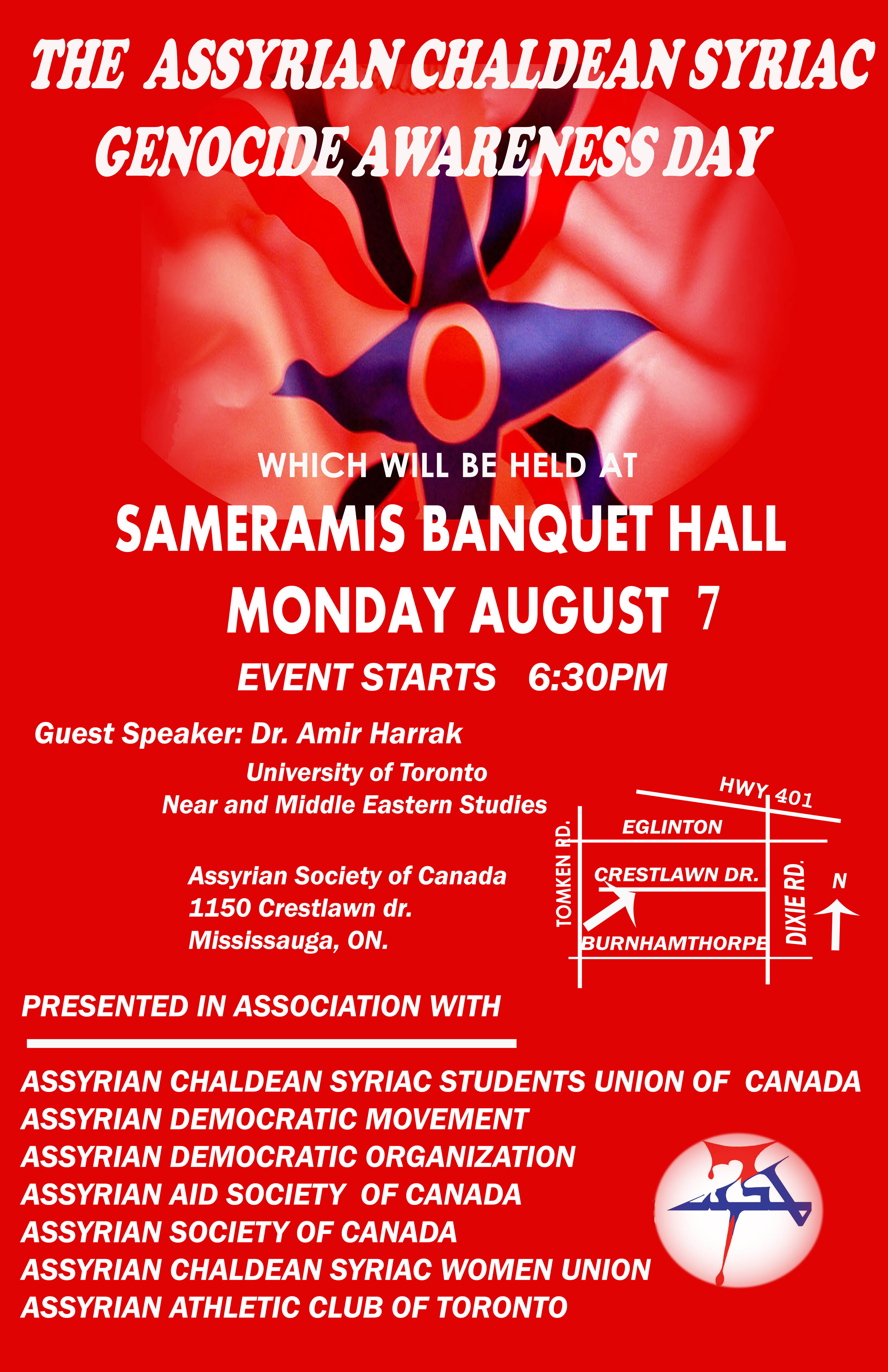 |
|
|
Thank You
The following individuals contributed to the publication of this issue:
|
| Fred Aprim |
California |
| Dr. Matay Beth Arsan |
Holland |
Hanna Chamoun
|
Sweden |
| David Chibo |
Australia |
| Tomy Doomany |
Califorrnia |
| Mazin Enwiya |
Chicago |
| Natalie Gewargis |
Chicago |
| Vivian Mary Hermiz |
California |
| Nahrain E. Kamber |
California |
| Sankho Sada |
Canada |
| Rebecca Simon |
California |
| Mary Younan |
Canada |
| Rochelle Yousefian |
California |
|
ZINDA Magazine is published weekly. Views expressed in ZINDA do not necessarily represent those of the ZINDA editors, or any of our associated staff. This publication reserves the right, at its sole discretion, not to publish comments or articles previously printed in or submitted to other journals. ZINDA reserves the right to publish and republish your submission in any form or medium. All letters and messages require the name(s) of sender and/or author. All messages published in the SURFS UP! section must be in 500 words or less and bear the name of the author(s). Distribution of material featured in ZINDA is not restricted, but permission from ZINDA is required. This service is meant for the exchange of information, analyses and news. Any material published in Zinda Magazine will not be removed later at the request of the sender. For free subscription to Zinda Magazine, send e-mail with your name, address, telephone number to: zcrew@zindamagazine.com.
ZINDA means "Spark of Fire" in modern Syriac (Assyrian); Zinda's Red Swoosh is a rendering of the seventh letter in the Assyrian alphabet, letter ZEN, and the first letter in the word "Zinda". For more information about the Assyrian culture and heritage write to Zinda Magazine.
Zinda Magazine™ Copyright © Zinda Inc., 1994-2006 - All Rights Reserved - www.zindamagazine.com |








